Foreign Direct Investment and Firm Performance
VerifiedAdded on 2020/05/28
|20
|4683
|112
AI Summary
The assignment delves into the complex relationship between Foreign Direct Investment (FDI) and firm performance. It examines how various ownership structures influence this relationship, particularly in emerging economies. The analysis draws upon a selection of academic research papers to provide insights into the impact of FDI on firm-level outcomes and explores the mediating role of factors like absorptive capacity and corporate social responsibility.
Contribute Materials
Your contribution can guide someone’s learning journey. Share your
documents today.
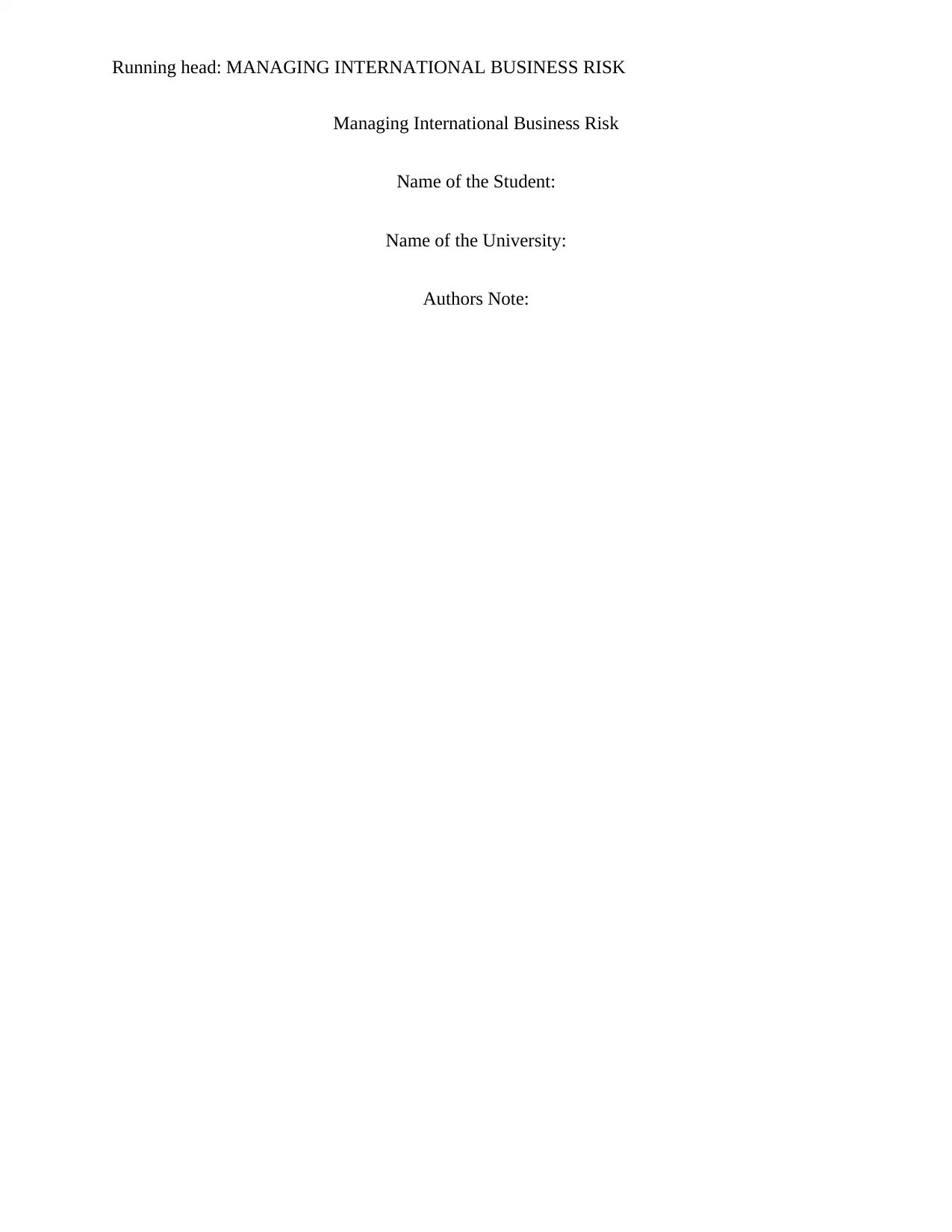
Running head: MANAGING INTERNATIONAL BUSINESS RISK
Managing International Business Risk
Name of the Student:
Name of the University:
Authors Note:
Managing International Business Risk
Name of the Student:
Name of the University:
Authors Note:
Secure Best Marks with AI Grader
Need help grading? Try our AI Grader for instant feedback on your assignments.
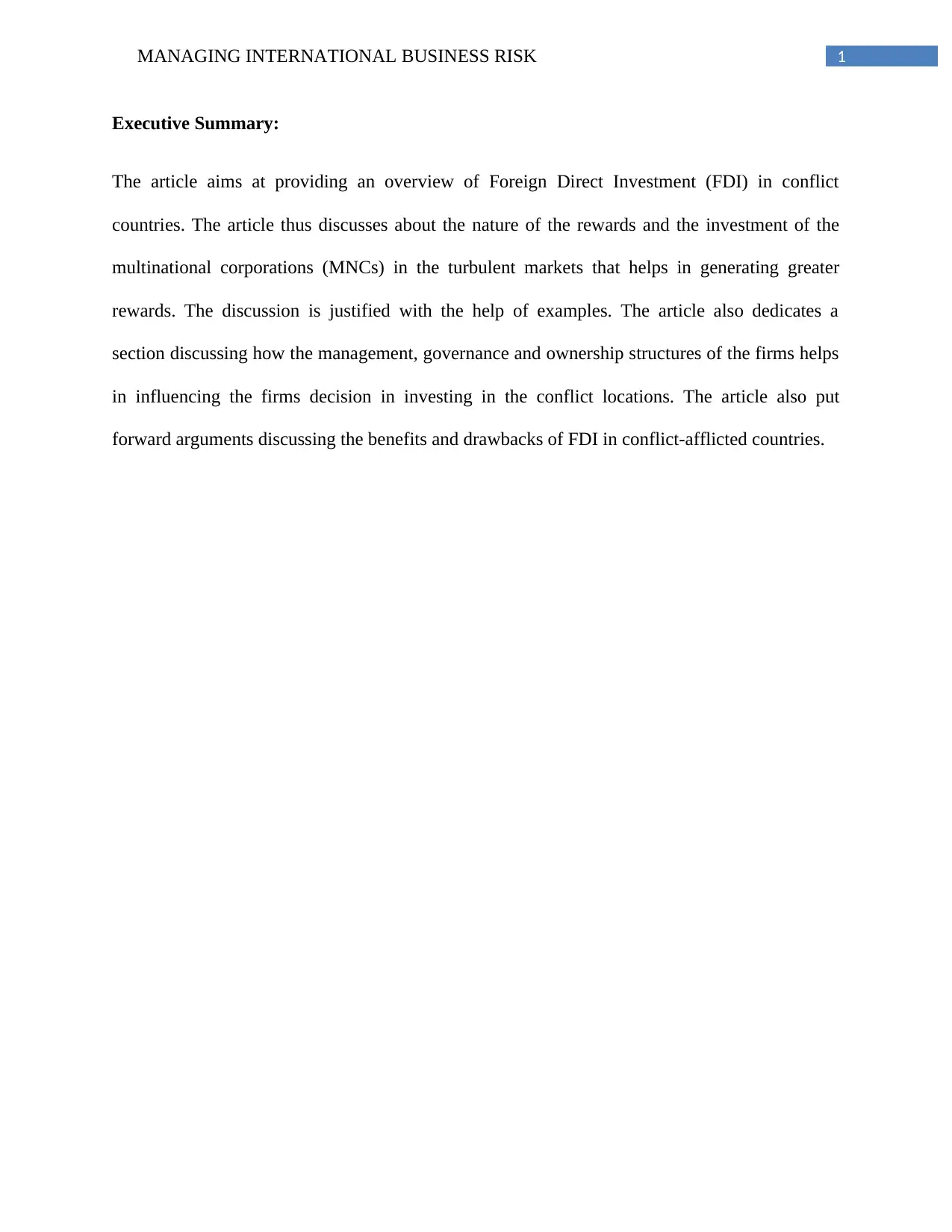
1MANAGING INTERNATIONAL BUSINESS RISK
Executive Summary:
The article aims at providing an overview of Foreign Direct Investment (FDI) in conflict
countries. The article thus discusses about the nature of the rewards and the investment of the
multinational corporations (MNCs) in the turbulent markets that helps in generating greater
rewards. The discussion is justified with the help of examples. The article also dedicates a
section discussing how the management, governance and ownership structures of the firms helps
in influencing the firms decision in investing in the conflict locations. The article also put
forward arguments discussing the benefits and drawbacks of FDI in conflict-afflicted countries.
Executive Summary:
The article aims at providing an overview of Foreign Direct Investment (FDI) in conflict
countries. The article thus discusses about the nature of the rewards and the investment of the
multinational corporations (MNCs) in the turbulent markets that helps in generating greater
rewards. The discussion is justified with the help of examples. The article also dedicates a
section discussing how the management, governance and ownership structures of the firms helps
in influencing the firms decision in investing in the conflict locations. The article also put
forward arguments discussing the benefits and drawbacks of FDI in conflict-afflicted countries.
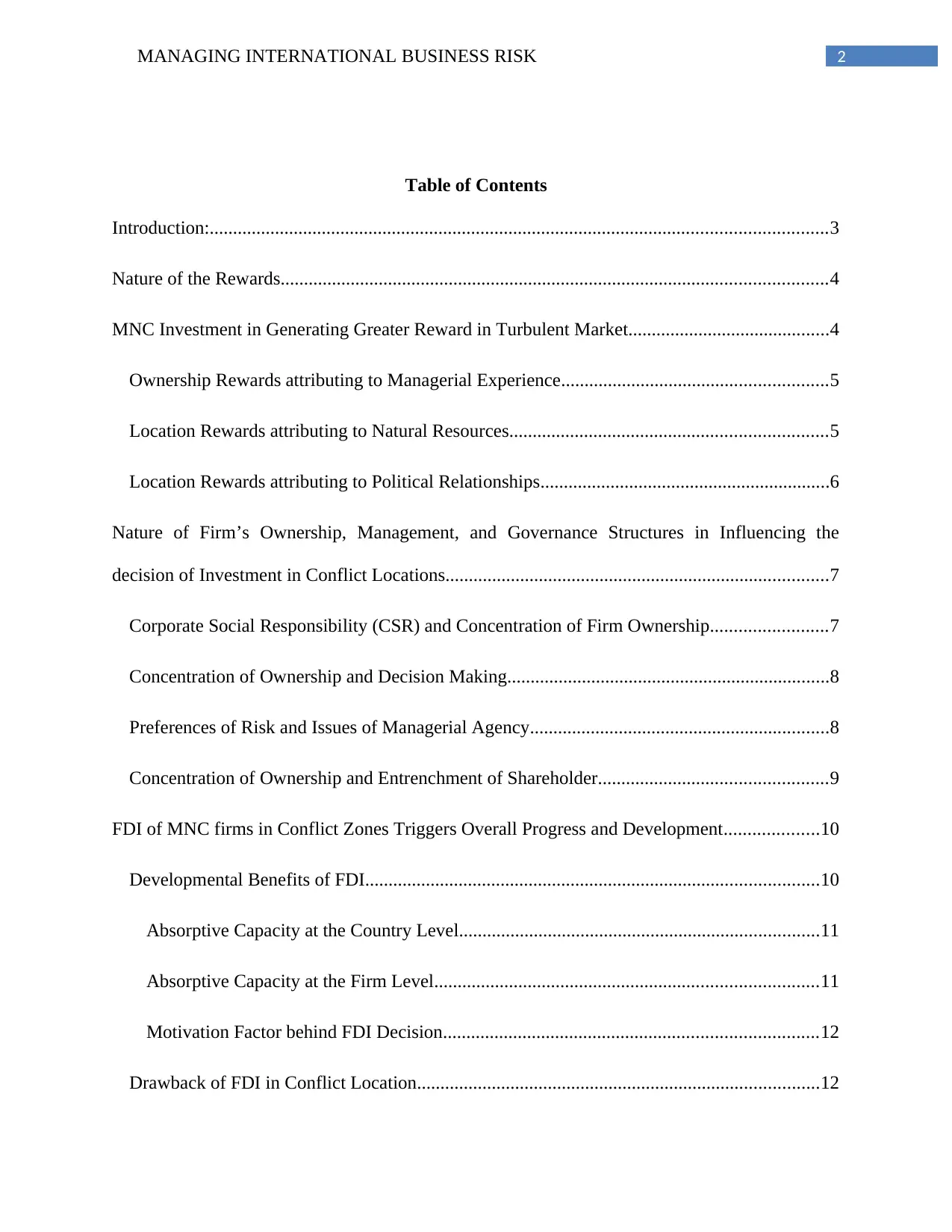
2MANAGING INTERNATIONAL BUSINESS RISK
Table of Contents
Introduction:....................................................................................................................................3
Nature of the Rewards.....................................................................................................................4
MNC Investment in Generating Greater Reward in Turbulent Market...........................................4
Ownership Rewards attributing to Managerial Experience.........................................................5
Location Rewards attributing to Natural Resources....................................................................5
Location Rewards attributing to Political Relationships..............................................................6
Nature of Firm’s Ownership, Management, and Governance Structures in Influencing the
decision of Investment in Conflict Locations..................................................................................7
Corporate Social Responsibility (CSR) and Concentration of Firm Ownership.........................7
Concentration of Ownership and Decision Making.....................................................................8
Preferences of Risk and Issues of Managerial Agency................................................................8
Concentration of Ownership and Entrenchment of Shareholder.................................................9
FDI of MNC firms in Conflict Zones Triggers Overall Progress and Development....................10
Developmental Benefits of FDI.................................................................................................10
Absorptive Capacity at the Country Level.............................................................................11
Absorptive Capacity at the Firm Level..................................................................................11
Motivation Factor behind FDI Decision................................................................................12
Drawback of FDI in Conflict Location......................................................................................12
Table of Contents
Introduction:....................................................................................................................................3
Nature of the Rewards.....................................................................................................................4
MNC Investment in Generating Greater Reward in Turbulent Market...........................................4
Ownership Rewards attributing to Managerial Experience.........................................................5
Location Rewards attributing to Natural Resources....................................................................5
Location Rewards attributing to Political Relationships..............................................................6
Nature of Firm’s Ownership, Management, and Governance Structures in Influencing the
decision of Investment in Conflict Locations..................................................................................7
Corporate Social Responsibility (CSR) and Concentration of Firm Ownership.........................7
Concentration of Ownership and Decision Making.....................................................................8
Preferences of Risk and Issues of Managerial Agency................................................................8
Concentration of Ownership and Entrenchment of Shareholder.................................................9
FDI of MNC firms in Conflict Zones Triggers Overall Progress and Development....................10
Developmental Benefits of FDI.................................................................................................10
Absorptive Capacity at the Country Level.............................................................................11
Absorptive Capacity at the Firm Level..................................................................................11
Motivation Factor behind FDI Decision................................................................................12
Drawback of FDI in Conflict Location......................................................................................12
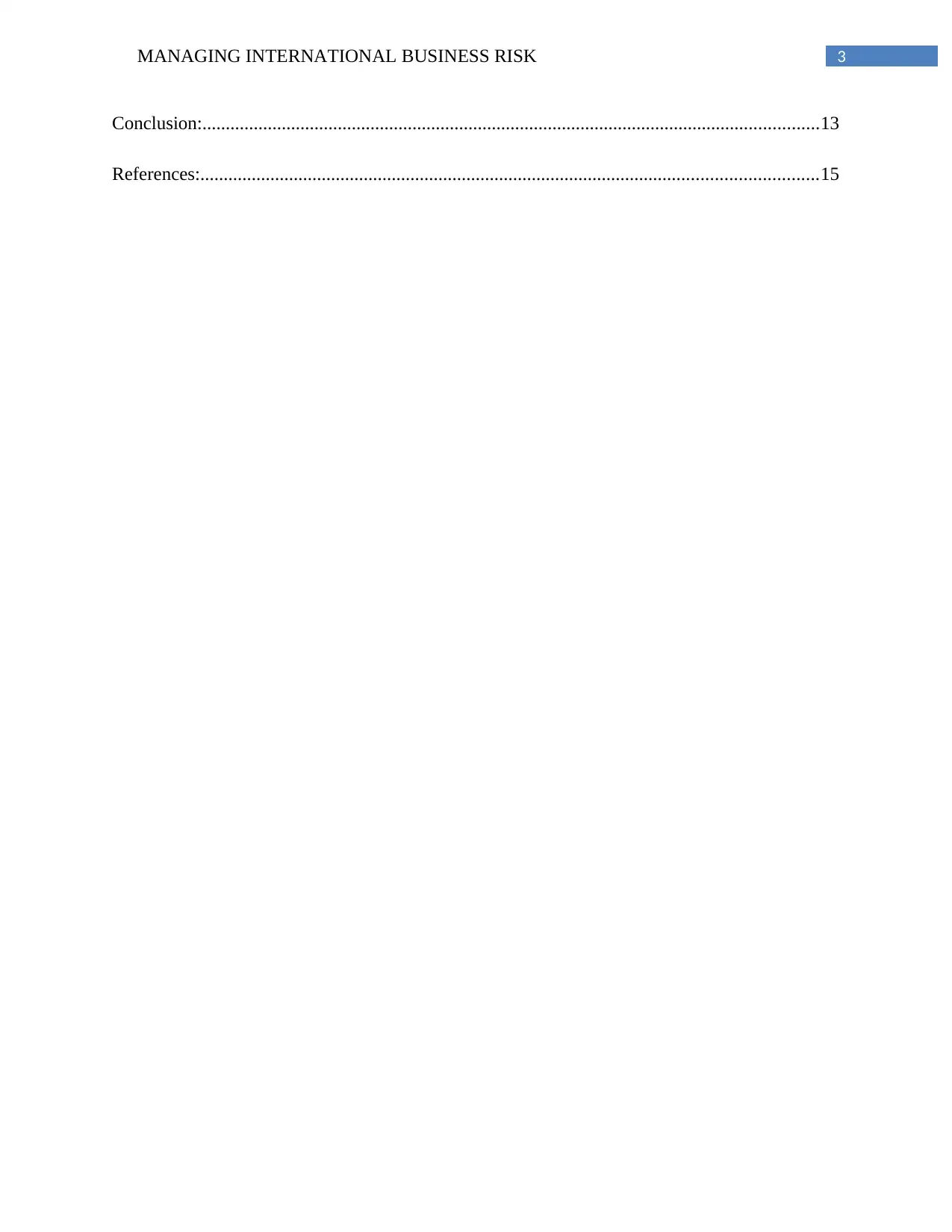
3MANAGING INTERNATIONAL BUSINESS RISK
Conclusion:....................................................................................................................................13
References:....................................................................................................................................15
Conclusion:....................................................................................................................................13
References:....................................................................................................................................15
Secure Best Marks with AI Grader
Need help grading? Try our AI Grader for instant feedback on your assignments.
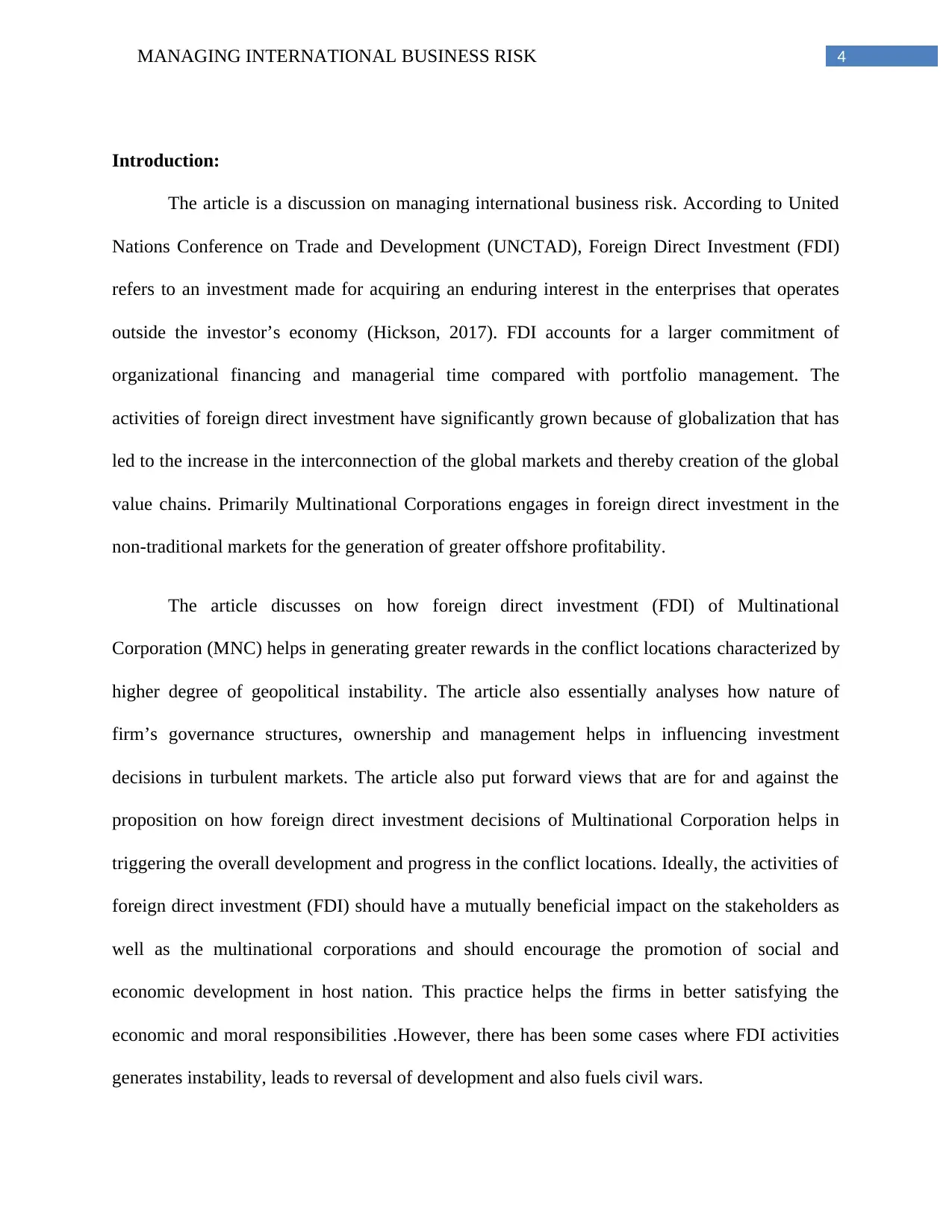
4MANAGING INTERNATIONAL BUSINESS RISK
Introduction:
The article is a discussion on managing international business risk. According to United
Nations Conference on Trade and Development (UNCTAD), Foreign Direct Investment (FDI)
refers to an investment made for acquiring an enduring interest in the enterprises that operates
outside the investor’s economy (Hickson, 2017). FDI accounts for a larger commitment of
organizational financing and managerial time compared with portfolio management. The
activities of foreign direct investment have significantly grown because of globalization that has
led to the increase in the interconnection of the global markets and thereby creation of the global
value chains. Primarily Multinational Corporations engages in foreign direct investment in the
non-traditional markets for the generation of greater offshore profitability.
The article discusses on how foreign direct investment (FDI) of Multinational
Corporation (MNC) helps in generating greater rewards in the conflict locations characterized by
higher degree of geopolitical instability. The article also essentially analyses how nature of
firm’s governance structures, ownership and management helps in influencing investment
decisions in turbulent markets. The article also put forward views that are for and against the
proposition on how foreign direct investment decisions of Multinational Corporation helps in
triggering the overall development and progress in the conflict locations. Ideally, the activities of
foreign direct investment (FDI) should have a mutually beneficial impact on the stakeholders as
well as the multinational corporations and should encourage the promotion of social and
economic development in host nation. This practice helps the firms in better satisfying the
economic and moral responsibilities .However, there has been some cases where FDI activities
generates instability, leads to reversal of development and also fuels civil wars.
Introduction:
The article is a discussion on managing international business risk. According to United
Nations Conference on Trade and Development (UNCTAD), Foreign Direct Investment (FDI)
refers to an investment made for acquiring an enduring interest in the enterprises that operates
outside the investor’s economy (Hickson, 2017). FDI accounts for a larger commitment of
organizational financing and managerial time compared with portfolio management. The
activities of foreign direct investment have significantly grown because of globalization that has
led to the increase in the interconnection of the global markets and thereby creation of the global
value chains. Primarily Multinational Corporations engages in foreign direct investment in the
non-traditional markets for the generation of greater offshore profitability.
The article discusses on how foreign direct investment (FDI) of Multinational
Corporation (MNC) helps in generating greater rewards in the conflict locations characterized by
higher degree of geopolitical instability. The article also essentially analyses how nature of
firm’s governance structures, ownership and management helps in influencing investment
decisions in turbulent markets. The article also put forward views that are for and against the
proposition on how foreign direct investment decisions of Multinational Corporation helps in
triggering the overall development and progress in the conflict locations. Ideally, the activities of
foreign direct investment (FDI) should have a mutually beneficial impact on the stakeholders as
well as the multinational corporations and should encourage the promotion of social and
economic development in host nation. This practice helps the firms in better satisfying the
economic and moral responsibilities .However, there has been some cases where FDI activities
generates instability, leads to reversal of development and also fuels civil wars.
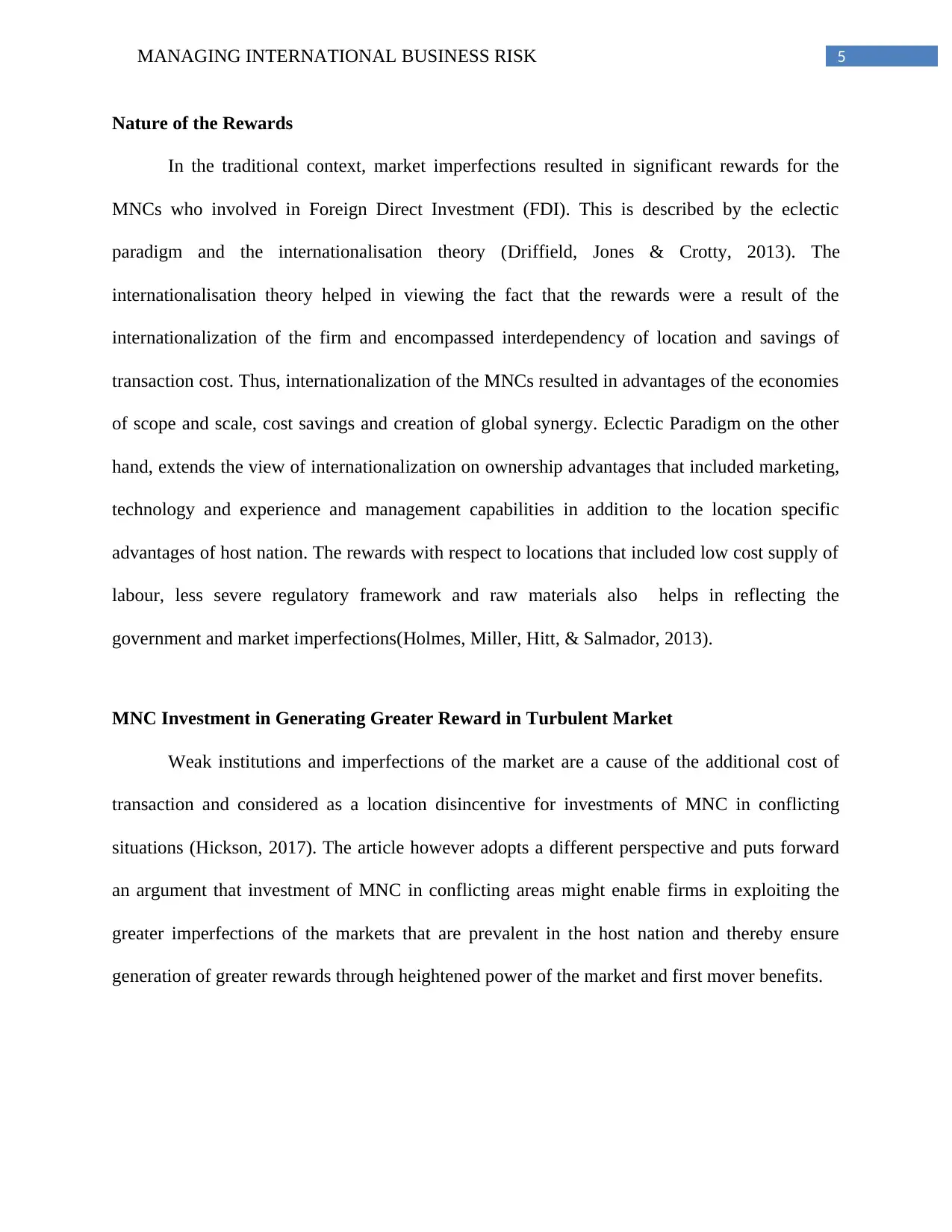
5MANAGING INTERNATIONAL BUSINESS RISK
Nature of the Rewards
In the traditional context, market imperfections resulted in significant rewards for the
MNCs who involved in Foreign Direct Investment (FDI). This is described by the eclectic
paradigm and the internationalisation theory (Driffield, Jones & Crotty, 2013). The
internationalisation theory helped in viewing the fact that the rewards were a result of the
internationalization of the firm and encompassed interdependency of location and savings of
transaction cost. Thus, internationalization of the MNCs resulted in advantages of the economies
of scope and scale, cost savings and creation of global synergy. Eclectic Paradigm on the other
hand, extends the view of internationalization on ownership advantages that included marketing,
technology and experience and management capabilities in addition to the location specific
advantages of host nation. The rewards with respect to locations that included low cost supply of
labour, less severe regulatory framework and raw materials also helps in reflecting the
government and market imperfections(Holmes, Miller, Hitt, & Salmador, 2013).
MNC Investment in Generating Greater Reward in Turbulent Market
Weak institutions and imperfections of the market are a cause of the additional cost of
transaction and considered as a location disincentive for investments of MNC in conflicting
situations (Hickson, 2017). The article however adopts a different perspective and puts forward
an argument that investment of MNC in conflicting areas might enable firms in exploiting the
greater imperfections of the markets that are prevalent in the host nation and thereby ensure
generation of greater rewards through heightened power of the market and first mover benefits.
Nature of the Rewards
In the traditional context, market imperfections resulted in significant rewards for the
MNCs who involved in Foreign Direct Investment (FDI). This is described by the eclectic
paradigm and the internationalisation theory (Driffield, Jones & Crotty, 2013). The
internationalisation theory helped in viewing the fact that the rewards were a result of the
internationalization of the firm and encompassed interdependency of location and savings of
transaction cost. Thus, internationalization of the MNCs resulted in advantages of the economies
of scope and scale, cost savings and creation of global synergy. Eclectic Paradigm on the other
hand, extends the view of internationalization on ownership advantages that included marketing,
technology and experience and management capabilities in addition to the location specific
advantages of host nation. The rewards with respect to locations that included low cost supply of
labour, less severe regulatory framework and raw materials also helps in reflecting the
government and market imperfections(Holmes, Miller, Hitt, & Salmador, 2013).
MNC Investment in Generating Greater Reward in Turbulent Market
Weak institutions and imperfections of the market are a cause of the additional cost of
transaction and considered as a location disincentive for investments of MNC in conflicting
situations (Hickson, 2017). The article however adopts a different perspective and puts forward
an argument that investment of MNC in conflicting areas might enable firms in exploiting the
greater imperfections of the markets that are prevalent in the host nation and thereby ensure
generation of greater rewards through heightened power of the market and first mover benefits.
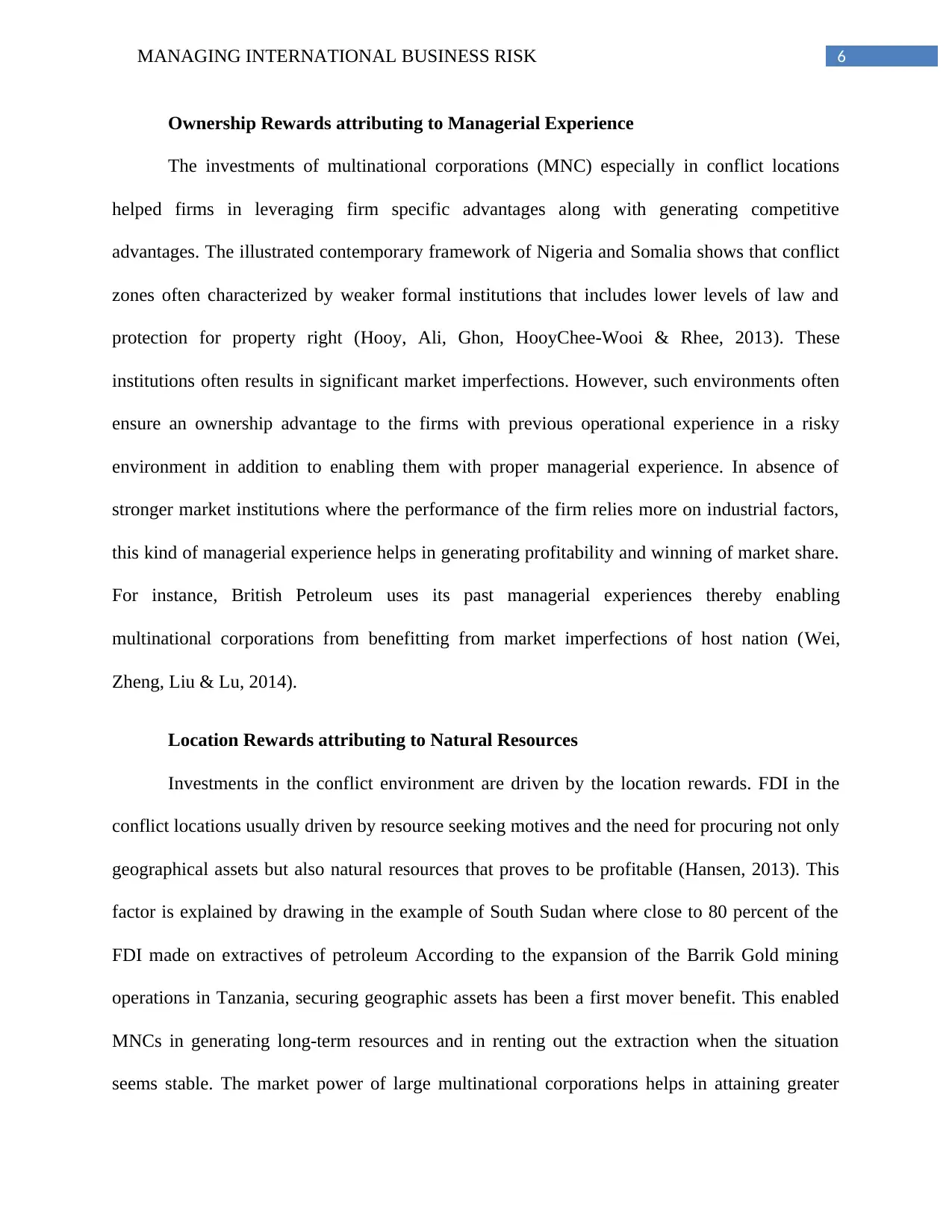
6MANAGING INTERNATIONAL BUSINESS RISK
Ownership Rewards attributing to Managerial Experience
The investments of multinational corporations (MNC) especially in conflict locations
helped firms in leveraging firm specific advantages along with generating competitive
advantages. The illustrated contemporary framework of Nigeria and Somalia shows that conflict
zones often characterized by weaker formal institutions that includes lower levels of law and
protection for property right (Hooy, Ali, Ghon, HooyChee-Wooi & Rhee, 2013). These
institutions often results in significant market imperfections. However, such environments often
ensure an ownership advantage to the firms with previous operational experience in a risky
environment in addition to enabling them with proper managerial experience. In absence of
stronger market institutions where the performance of the firm relies more on industrial factors,
this kind of managerial experience helps in generating profitability and winning of market share.
For instance, British Petroleum uses its past managerial experiences thereby enabling
multinational corporations from benefitting from market imperfections of host nation (Wei,
Zheng, Liu & Lu, 2014).
Location Rewards attributing to Natural Resources
Investments in the conflict environment are driven by the location rewards. FDI in the
conflict locations usually driven by resource seeking motives and the need for procuring not only
geographical assets but also natural resources that proves to be profitable (Hansen, 2013). This
factor is explained by drawing in the example of South Sudan where close to 80 percent of the
FDI made on extractives of petroleum According to the expansion of the Barrik Gold mining
operations in Tanzania, securing geographic assets has been a first mover benefit. This enabled
MNCs in generating long-term resources and in renting out the extraction when the situation
seems stable. The market power of large multinational corporations helps in attaining greater
Ownership Rewards attributing to Managerial Experience
The investments of multinational corporations (MNC) especially in conflict locations
helped firms in leveraging firm specific advantages along with generating competitive
advantages. The illustrated contemporary framework of Nigeria and Somalia shows that conflict
zones often characterized by weaker formal institutions that includes lower levels of law and
protection for property right (Hooy, Ali, Ghon, HooyChee-Wooi & Rhee, 2013). These
institutions often results in significant market imperfections. However, such environments often
ensure an ownership advantage to the firms with previous operational experience in a risky
environment in addition to enabling them with proper managerial experience. In absence of
stronger market institutions where the performance of the firm relies more on industrial factors,
this kind of managerial experience helps in generating profitability and winning of market share.
For instance, British Petroleum uses its past managerial experiences thereby enabling
multinational corporations from benefitting from market imperfections of host nation (Wei,
Zheng, Liu & Lu, 2014).
Location Rewards attributing to Natural Resources
Investments in the conflict environment are driven by the location rewards. FDI in the
conflict locations usually driven by resource seeking motives and the need for procuring not only
geographical assets but also natural resources that proves to be profitable (Hansen, 2013). This
factor is explained by drawing in the example of South Sudan where close to 80 percent of the
FDI made on extractives of petroleum According to the expansion of the Barrik Gold mining
operations in Tanzania, securing geographic assets has been a first mover benefit. This enabled
MNCs in generating long-term resources and in renting out the extraction when the situation
seems stable. The market power of large multinational corporations helps in attaining greater
Paraphrase This Document
Need a fresh take? Get an instant paraphrase of this document with our AI Paraphraser
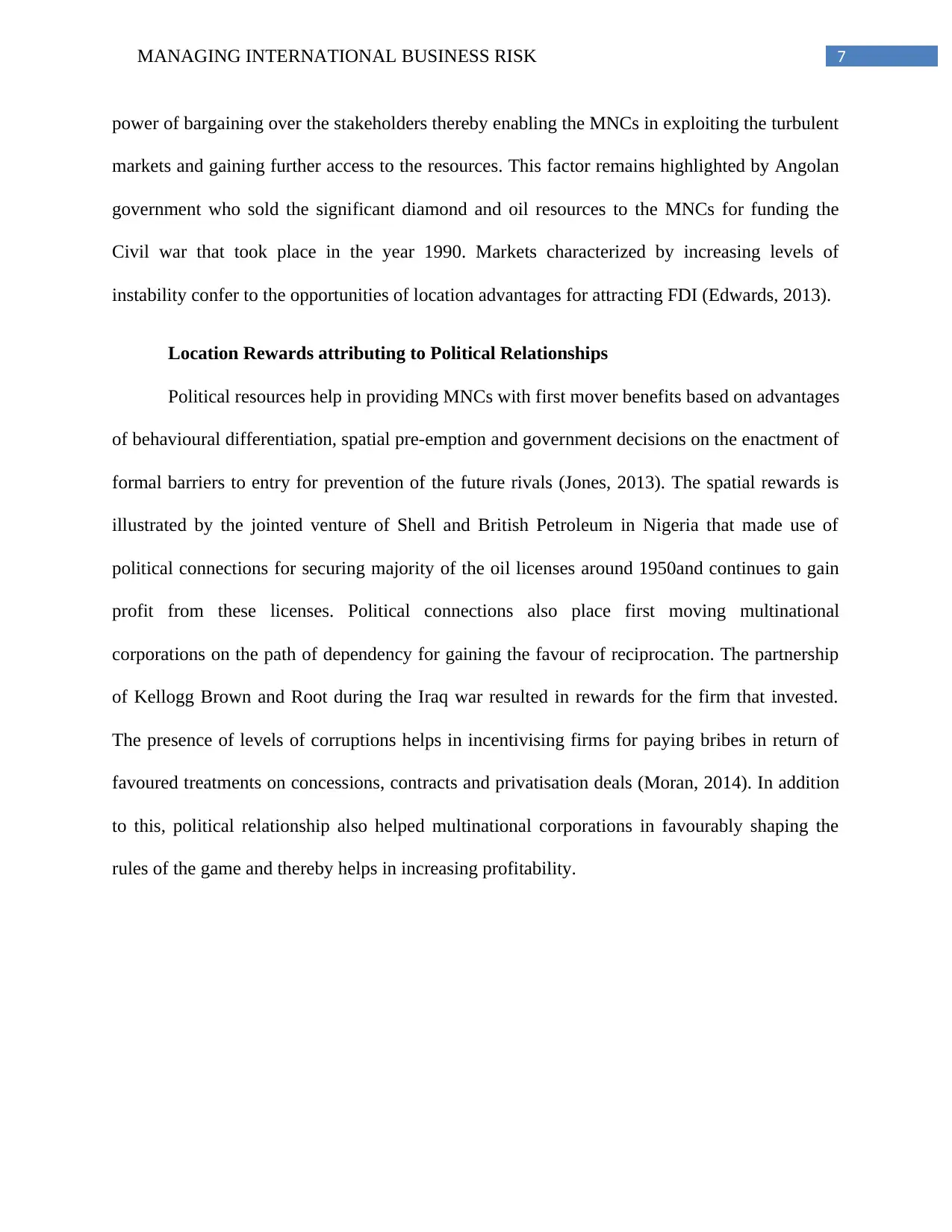
7MANAGING INTERNATIONAL BUSINESS RISK
power of bargaining over the stakeholders thereby enabling the MNCs in exploiting the turbulent
markets and gaining further access to the resources. This factor remains highlighted by Angolan
government who sold the significant diamond and oil resources to the MNCs for funding the
Civil war that took place in the year 1990. Markets characterized by increasing levels of
instability confer to the opportunities of location advantages for attracting FDI (Edwards, 2013).
Location Rewards attributing to Political Relationships
Political resources help in providing MNCs with first mover benefits based on advantages
of behavioural differentiation, spatial pre-emption and government decisions on the enactment of
formal barriers to entry for prevention of the future rivals (Jones, 2013). The spatial rewards is
illustrated by the jointed venture of Shell and British Petroleum in Nigeria that made use of
political connections for securing majority of the oil licenses around 1950and continues to gain
profit from these licenses. Political connections also place first moving multinational
corporations on the path of dependency for gaining the favour of reciprocation. The partnership
of Kellogg Brown and Root during the Iraq war resulted in rewards for the firm that invested.
The presence of levels of corruptions helps in incentivising firms for paying bribes in return of
favoured treatments on concessions, contracts and privatisation deals (Moran, 2014). In addition
to this, political relationship also helped multinational corporations in favourably shaping the
rules of the game and thereby helps in increasing profitability.
power of bargaining over the stakeholders thereby enabling the MNCs in exploiting the turbulent
markets and gaining further access to the resources. This factor remains highlighted by Angolan
government who sold the significant diamond and oil resources to the MNCs for funding the
Civil war that took place in the year 1990. Markets characterized by increasing levels of
instability confer to the opportunities of location advantages for attracting FDI (Edwards, 2013).
Location Rewards attributing to Political Relationships
Political resources help in providing MNCs with first mover benefits based on advantages
of behavioural differentiation, spatial pre-emption and government decisions on the enactment of
formal barriers to entry for prevention of the future rivals (Jones, 2013). The spatial rewards is
illustrated by the jointed venture of Shell and British Petroleum in Nigeria that made use of
political connections for securing majority of the oil licenses around 1950and continues to gain
profit from these licenses. Political connections also place first moving multinational
corporations on the path of dependency for gaining the favour of reciprocation. The partnership
of Kellogg Brown and Root during the Iraq war resulted in rewards for the firm that invested.
The presence of levels of corruptions helps in incentivising firms for paying bribes in return of
favoured treatments on concessions, contracts and privatisation deals (Moran, 2014). In addition
to this, political relationship also helped multinational corporations in favourably shaping the
rules of the game and thereby helps in increasing profitability.
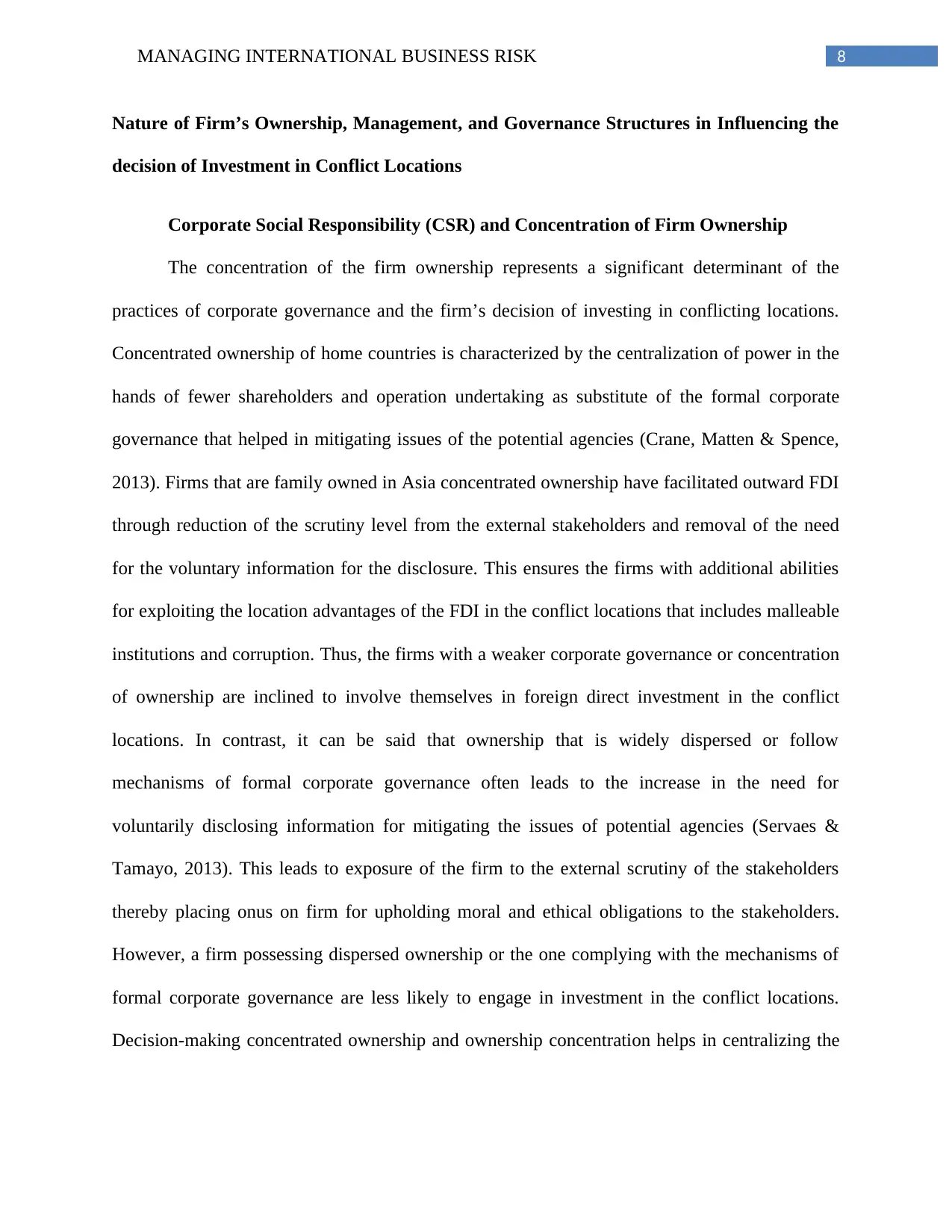
8MANAGING INTERNATIONAL BUSINESS RISK
Nature of Firm’s Ownership, Management, and Governance Structures in Influencing the
decision of Investment in Conflict Locations
Corporate Social Responsibility (CSR) and Concentration of Firm Ownership
The concentration of the firm ownership represents a significant determinant of the
practices of corporate governance and the firm’s decision of investing in conflicting locations.
Concentrated ownership of home countries is characterized by the centralization of power in the
hands of fewer shareholders and operation undertaking as substitute of the formal corporate
governance that helped in mitigating issues of the potential agencies (Crane, Matten & Spence,
2013). Firms that are family owned in Asia concentrated ownership have facilitated outward FDI
through reduction of the scrutiny level from the external stakeholders and removal of the need
for the voluntary information for the disclosure. This ensures the firms with additional abilities
for exploiting the location advantages of the FDI in the conflict locations that includes malleable
institutions and corruption. Thus, the firms with a weaker corporate governance or concentration
of ownership are inclined to involve themselves in foreign direct investment in the conflict
locations. In contrast, it can be said that ownership that is widely dispersed or follow
mechanisms of formal corporate governance often leads to the increase in the need for
voluntarily disclosing information for mitigating the issues of potential agencies (Servaes &
Tamayo, 2013). This leads to exposure of the firm to the external scrutiny of the stakeholders
thereby placing onus on firm for upholding moral and ethical obligations to the stakeholders.
However, a firm possessing dispersed ownership or the one complying with the mechanisms of
formal corporate governance are less likely to engage in investment in the conflict locations.
Decision-making concentrated ownership and ownership concentration helps in centralizing the
Nature of Firm’s Ownership, Management, and Governance Structures in Influencing the
decision of Investment in Conflict Locations
Corporate Social Responsibility (CSR) and Concentration of Firm Ownership
The concentration of the firm ownership represents a significant determinant of the
practices of corporate governance and the firm’s decision of investing in conflicting locations.
Concentrated ownership of home countries is characterized by the centralization of power in the
hands of fewer shareholders and operation undertaking as substitute of the formal corporate
governance that helped in mitigating issues of the potential agencies (Crane, Matten & Spence,
2013). Firms that are family owned in Asia concentrated ownership have facilitated outward FDI
through reduction of the scrutiny level from the external stakeholders and removal of the need
for the voluntary information for the disclosure. This ensures the firms with additional abilities
for exploiting the location advantages of the FDI in the conflict locations that includes malleable
institutions and corruption. Thus, the firms with a weaker corporate governance or concentration
of ownership are inclined to involve themselves in foreign direct investment in the conflict
locations. In contrast, it can be said that ownership that is widely dispersed or follow
mechanisms of formal corporate governance often leads to the increase in the need for
voluntarily disclosing information for mitigating the issues of potential agencies (Servaes &
Tamayo, 2013). This leads to exposure of the firm to the external scrutiny of the stakeholders
thereby placing onus on firm for upholding moral and ethical obligations to the stakeholders.
However, a firm possessing dispersed ownership or the one complying with the mechanisms of
formal corporate governance are less likely to engage in investment in the conflict locations.
Decision-making concentrated ownership and ownership concentration helps in centralizing the
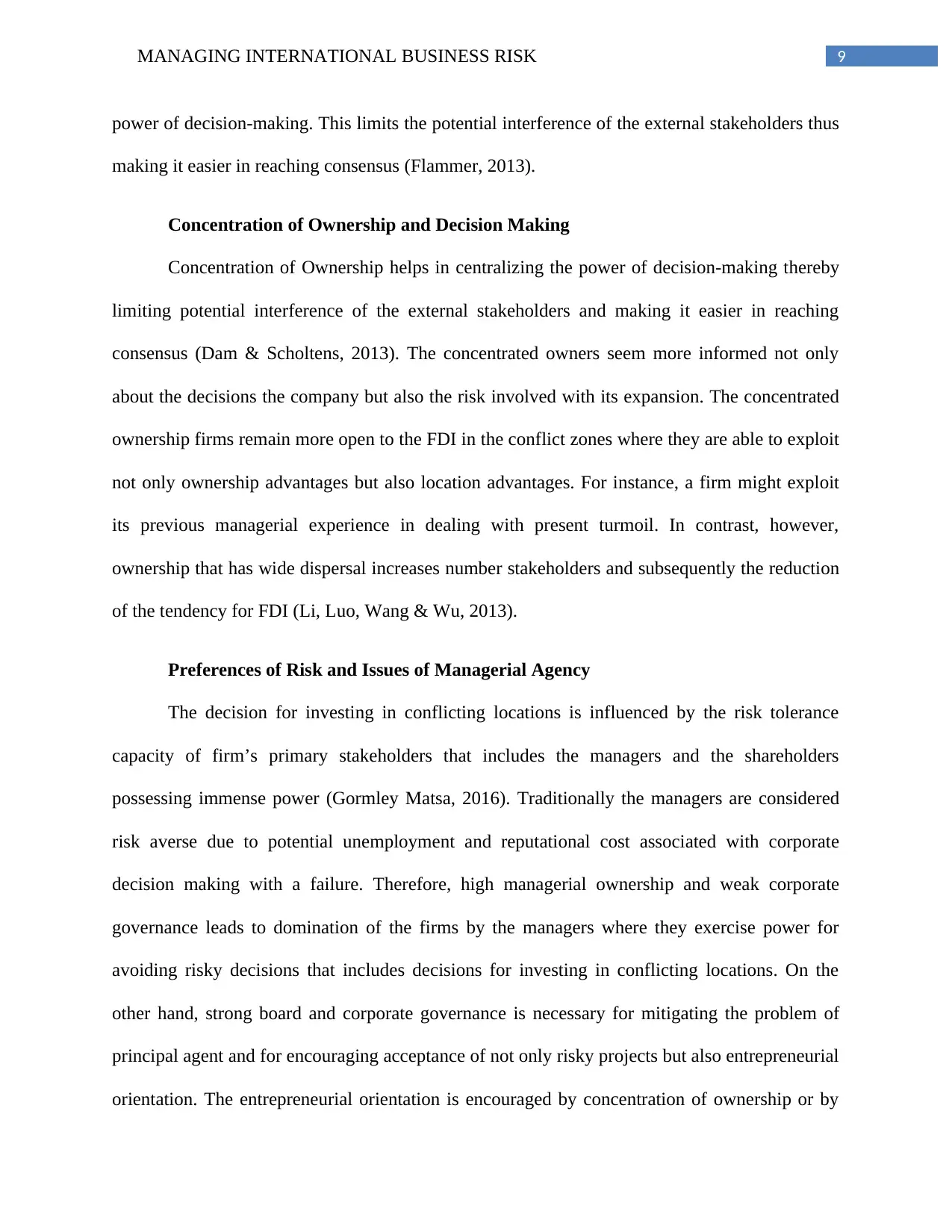
9MANAGING INTERNATIONAL BUSINESS RISK
power of decision-making. This limits the potential interference of the external stakeholders thus
making it easier in reaching consensus (Flammer, 2013).
Concentration of Ownership and Decision Making
Concentration of Ownership helps in centralizing the power of decision-making thereby
limiting potential interference of the external stakeholders and making it easier in reaching
consensus (Dam & Scholtens, 2013). The concentrated owners seem more informed not only
about the decisions the company but also the risk involved with its expansion. The concentrated
ownership firms remain more open to the FDI in the conflict zones where they are able to exploit
not only ownership advantages but also location advantages. For instance, a firm might exploit
its previous managerial experience in dealing with present turmoil. In contrast, however,
ownership that has wide dispersal increases number stakeholders and subsequently the reduction
of the tendency for FDI (Li, Luo, Wang & Wu, 2013).
Preferences of Risk and Issues of Managerial Agency
The decision for investing in conflicting locations is influenced by the risk tolerance
capacity of firm’s primary stakeholders that includes the managers and the shareholders
possessing immense power (Gormley Matsa, 2016). Traditionally the managers are considered
risk averse due to potential unemployment and reputational cost associated with corporate
decision making with a failure. Therefore, high managerial ownership and weak corporate
governance leads to domination of the firms by the managers where they exercise power for
avoiding risky decisions that includes decisions for investing in conflicting locations. On the
other hand, strong board and corporate governance is necessary for mitigating the problem of
principal agent and for encouraging acceptance of not only risky projects but also entrepreneurial
orientation. The entrepreneurial orientation is encouraged by concentration of ownership or by
power of decision-making. This limits the potential interference of the external stakeholders thus
making it easier in reaching consensus (Flammer, 2013).
Concentration of Ownership and Decision Making
Concentration of Ownership helps in centralizing the power of decision-making thereby
limiting potential interference of the external stakeholders and making it easier in reaching
consensus (Dam & Scholtens, 2013). The concentrated owners seem more informed not only
about the decisions the company but also the risk involved with its expansion. The concentrated
ownership firms remain more open to the FDI in the conflict zones where they are able to exploit
not only ownership advantages but also location advantages. For instance, a firm might exploit
its previous managerial experience in dealing with present turmoil. In contrast, however,
ownership that has wide dispersal increases number stakeholders and subsequently the reduction
of the tendency for FDI (Li, Luo, Wang & Wu, 2013).
Preferences of Risk and Issues of Managerial Agency
The decision for investing in conflicting locations is influenced by the risk tolerance
capacity of firm’s primary stakeholders that includes the managers and the shareholders
possessing immense power (Gormley Matsa, 2016). Traditionally the managers are considered
risk averse due to potential unemployment and reputational cost associated with corporate
decision making with a failure. Therefore, high managerial ownership and weak corporate
governance leads to domination of the firms by the managers where they exercise power for
avoiding risky decisions that includes decisions for investing in conflicting locations. On the
other hand, strong board and corporate governance is necessary for mitigating the problem of
principal agent and for encouraging acceptance of not only risky projects but also entrepreneurial
orientation. The entrepreneurial orientation is encouraged by concentration of ownership or by
Secure Best Marks with AI Grader
Need help grading? Try our AI Grader for instant feedback on your assignments.
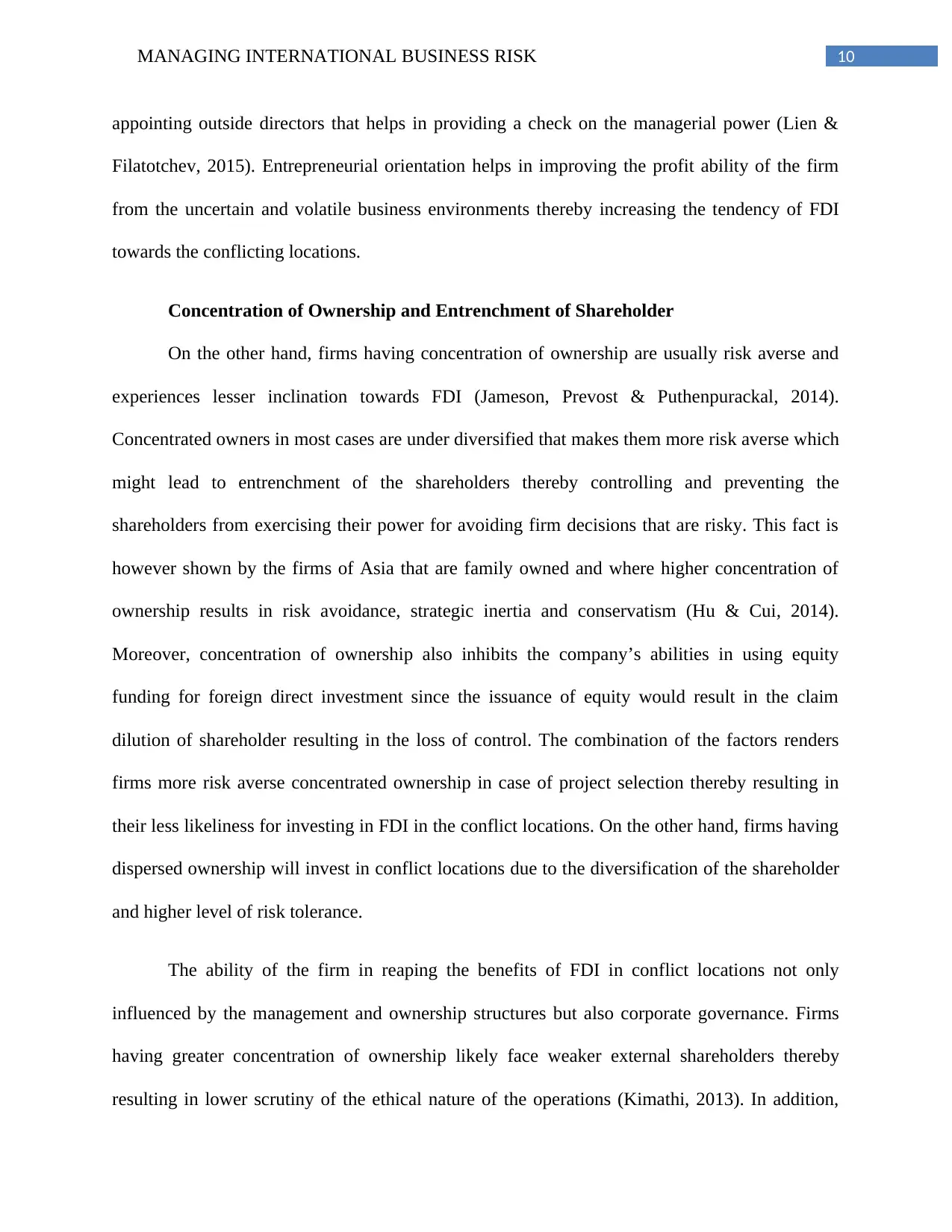
10MANAGING INTERNATIONAL BUSINESS RISK
appointing outside directors that helps in providing a check on the managerial power (Lien &
Filatotchev, 2015). Entrepreneurial orientation helps in improving the profit ability of the firm
from the uncertain and volatile business environments thereby increasing the tendency of FDI
towards the conflicting locations.
Concentration of Ownership and Entrenchment of Shareholder
On the other hand, firms having concentration of ownership are usually risk averse and
experiences lesser inclination towards FDI (Jameson, Prevost & Puthenpurackal, 2014).
Concentrated owners in most cases are under diversified that makes them more risk averse which
might lead to entrenchment of the shareholders thereby controlling and preventing the
shareholders from exercising their power for avoiding firm decisions that are risky. This fact is
however shown by the firms of Asia that are family owned and where higher concentration of
ownership results in risk avoidance, strategic inertia and conservatism (Hu & Cui, 2014).
Moreover, concentration of ownership also inhibits the company’s abilities in using equity
funding for foreign direct investment since the issuance of equity would result in the claim
dilution of shareholder resulting in the loss of control. The combination of the factors renders
firms more risk averse concentrated ownership in case of project selection thereby resulting in
their less likeliness for investing in FDI in the conflict locations. On the other hand, firms having
dispersed ownership will invest in conflict locations due to the diversification of the shareholder
and higher level of risk tolerance.
The ability of the firm in reaping the benefits of FDI in conflict locations not only
influenced by the management and ownership structures but also corporate governance. Firms
having greater concentration of ownership likely face weaker external shareholders thereby
resulting in lower scrutiny of the ethical nature of the operations (Kimathi, 2013). In addition,
appointing outside directors that helps in providing a check on the managerial power (Lien &
Filatotchev, 2015). Entrepreneurial orientation helps in improving the profit ability of the firm
from the uncertain and volatile business environments thereby increasing the tendency of FDI
towards the conflicting locations.
Concentration of Ownership and Entrenchment of Shareholder
On the other hand, firms having concentration of ownership are usually risk averse and
experiences lesser inclination towards FDI (Jameson, Prevost & Puthenpurackal, 2014).
Concentrated owners in most cases are under diversified that makes them more risk averse which
might lead to entrenchment of the shareholders thereby controlling and preventing the
shareholders from exercising their power for avoiding firm decisions that are risky. This fact is
however shown by the firms of Asia that are family owned and where higher concentration of
ownership results in risk avoidance, strategic inertia and conservatism (Hu & Cui, 2014).
Moreover, concentration of ownership also inhibits the company’s abilities in using equity
funding for foreign direct investment since the issuance of equity would result in the claim
dilution of shareholder resulting in the loss of control. The combination of the factors renders
firms more risk averse concentrated ownership in case of project selection thereby resulting in
their less likeliness for investing in FDI in the conflict locations. On the other hand, firms having
dispersed ownership will invest in conflict locations due to the diversification of the shareholder
and higher level of risk tolerance.
The ability of the firm in reaping the benefits of FDI in conflict locations not only
influenced by the management and ownership structures but also corporate governance. Firms
having greater concentration of ownership likely face weaker external shareholders thereby
resulting in lower scrutiny of the ethical nature of the operations (Kimathi, 2013). In addition,
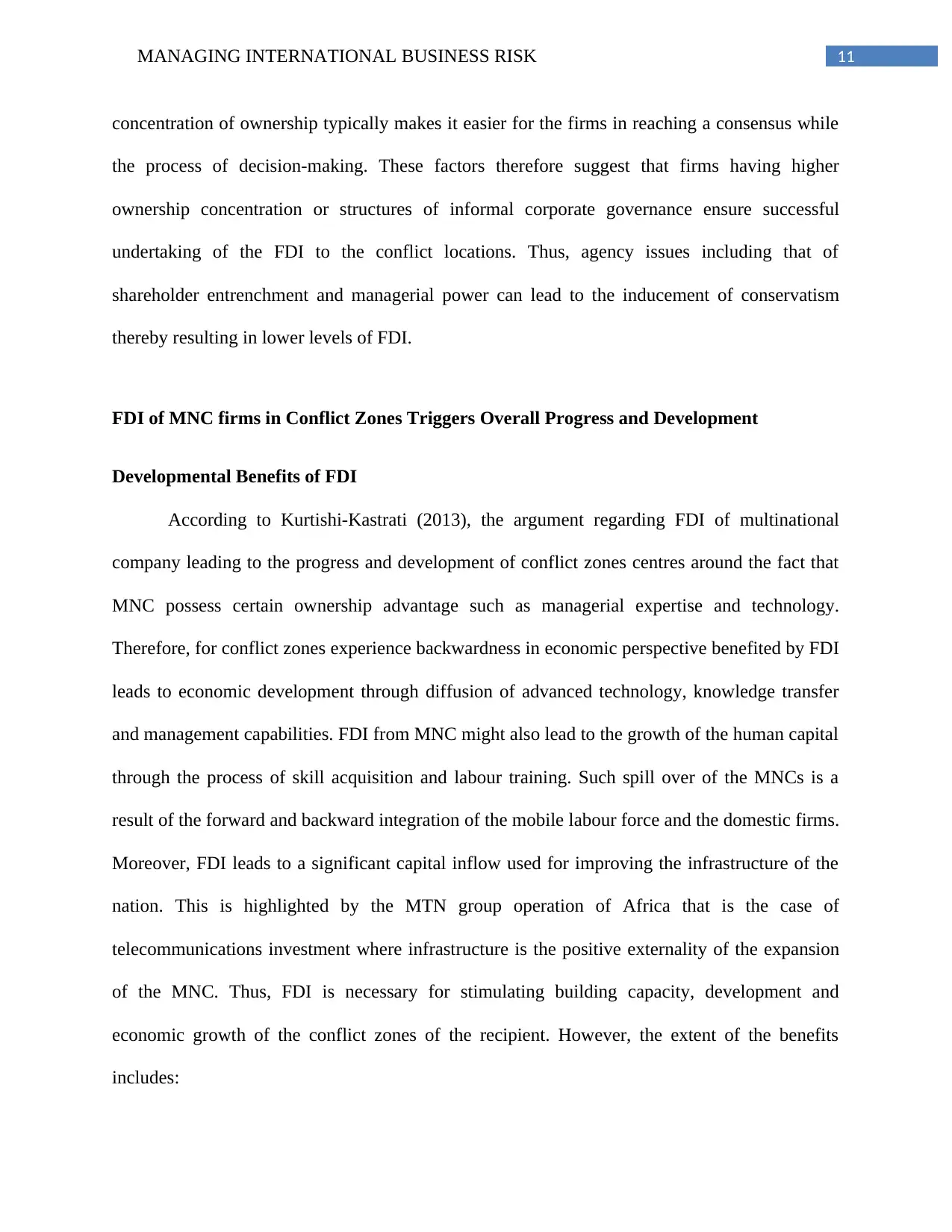
11MANAGING INTERNATIONAL BUSINESS RISK
concentration of ownership typically makes it easier for the firms in reaching a consensus while
the process of decision-making. These factors therefore suggest that firms having higher
ownership concentration or structures of informal corporate governance ensure successful
undertaking of the FDI to the conflict locations. Thus, agency issues including that of
shareholder entrenchment and managerial power can lead to the inducement of conservatism
thereby resulting in lower levels of FDI.
FDI of MNC firms in Conflict Zones Triggers Overall Progress and Development
Developmental Benefits of FDI
According to Kurtishi-Kastrati (2013), the argument regarding FDI of multinational
company leading to the progress and development of conflict zones centres around the fact that
MNC possess certain ownership advantage such as managerial expertise and technology.
Therefore, for conflict zones experience backwardness in economic perspective benefited by FDI
leads to economic development through diffusion of advanced technology, knowledge transfer
and management capabilities. FDI from MNC might also lead to the growth of the human capital
through the process of skill acquisition and labour training. Such spill over of the MNCs is a
result of the forward and backward integration of the mobile labour force and the domestic firms.
Moreover, FDI leads to a significant capital inflow used for improving the infrastructure of the
nation. This is highlighted by the MTN group operation of Africa that is the case of
telecommunications investment where infrastructure is the positive externality of the expansion
of the MNC. Thus, FDI is necessary for stimulating building capacity, development and
economic growth of the conflict zones of the recipient. However, the extent of the benefits
includes:
concentration of ownership typically makes it easier for the firms in reaching a consensus while
the process of decision-making. These factors therefore suggest that firms having higher
ownership concentration or structures of informal corporate governance ensure successful
undertaking of the FDI to the conflict locations. Thus, agency issues including that of
shareholder entrenchment and managerial power can lead to the inducement of conservatism
thereby resulting in lower levels of FDI.
FDI of MNC firms in Conflict Zones Triggers Overall Progress and Development
Developmental Benefits of FDI
According to Kurtishi-Kastrati (2013), the argument regarding FDI of multinational
company leading to the progress and development of conflict zones centres around the fact that
MNC possess certain ownership advantage such as managerial expertise and technology.
Therefore, for conflict zones experience backwardness in economic perspective benefited by FDI
leads to economic development through diffusion of advanced technology, knowledge transfer
and management capabilities. FDI from MNC might also lead to the growth of the human capital
through the process of skill acquisition and labour training. Such spill over of the MNCs is a
result of the forward and backward integration of the mobile labour force and the domestic firms.
Moreover, FDI leads to a significant capital inflow used for improving the infrastructure of the
nation. This is highlighted by the MTN group operation of Africa that is the case of
telecommunications investment where infrastructure is the positive externality of the expansion
of the MNC. Thus, FDI is necessary for stimulating building capacity, development and
economic growth of the conflict zones of the recipient. However, the extent of the benefits
includes:
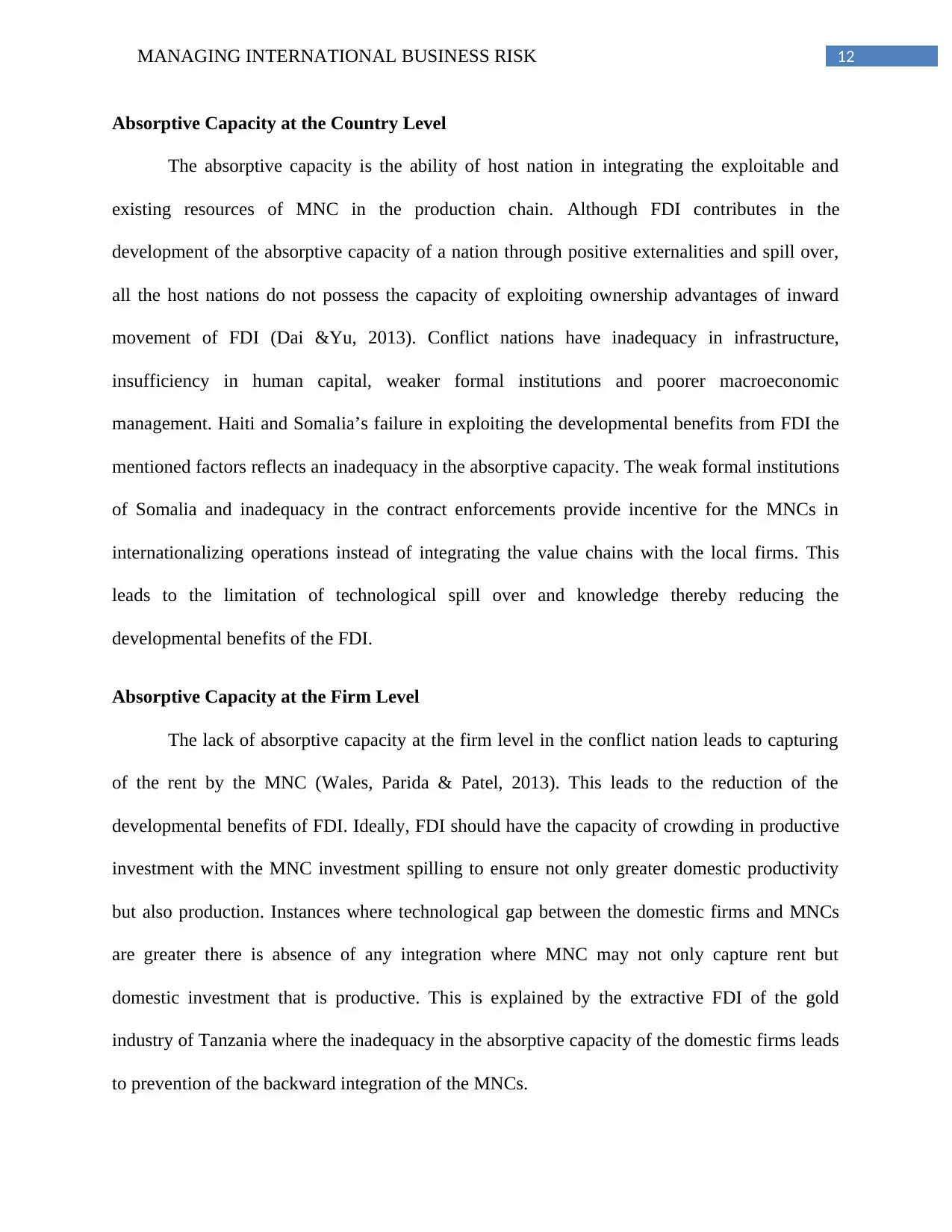
12MANAGING INTERNATIONAL BUSINESS RISK
Absorptive Capacity at the Country Level
The absorptive capacity is the ability of host nation in integrating the exploitable and
existing resources of MNC in the production chain. Although FDI contributes in the
development of the absorptive capacity of a nation through positive externalities and spill over,
all the host nations do not possess the capacity of exploiting ownership advantages of inward
movement of FDI (Dai &Yu, 2013). Conflict nations have inadequacy in infrastructure,
insufficiency in human capital, weaker formal institutions and poorer macroeconomic
management. Haiti and Somalia’s failure in exploiting the developmental benefits from FDI the
mentioned factors reflects an inadequacy in the absorptive capacity. The weak formal institutions
of Somalia and inadequacy in the contract enforcements provide incentive for the MNCs in
internationalizing operations instead of integrating the value chains with the local firms. This
leads to the limitation of technological spill over and knowledge thereby reducing the
developmental benefits of the FDI.
Absorptive Capacity at the Firm Level
The lack of absorptive capacity at the firm level in the conflict nation leads to capturing
of the rent by the MNC (Wales, Parida & Patel, 2013). This leads to the reduction of the
developmental benefits of FDI. Ideally, FDI should have the capacity of crowding in productive
investment with the MNC investment spilling to ensure not only greater domestic productivity
but also production. Instances where technological gap between the domestic firms and MNCs
are greater there is absence of any integration where MNC may not only capture rent but
domestic investment that is productive. This is explained by the extractive FDI of the gold
industry of Tanzania where the inadequacy in the absorptive capacity of the domestic firms leads
to prevention of the backward integration of the MNCs.
Absorptive Capacity at the Country Level
The absorptive capacity is the ability of host nation in integrating the exploitable and
existing resources of MNC in the production chain. Although FDI contributes in the
development of the absorptive capacity of a nation through positive externalities and spill over,
all the host nations do not possess the capacity of exploiting ownership advantages of inward
movement of FDI (Dai &Yu, 2013). Conflict nations have inadequacy in infrastructure,
insufficiency in human capital, weaker formal institutions and poorer macroeconomic
management. Haiti and Somalia’s failure in exploiting the developmental benefits from FDI the
mentioned factors reflects an inadequacy in the absorptive capacity. The weak formal institutions
of Somalia and inadequacy in the contract enforcements provide incentive for the MNCs in
internationalizing operations instead of integrating the value chains with the local firms. This
leads to the limitation of technological spill over and knowledge thereby reducing the
developmental benefits of the FDI.
Absorptive Capacity at the Firm Level
The lack of absorptive capacity at the firm level in the conflict nation leads to capturing
of the rent by the MNC (Wales, Parida & Patel, 2013). This leads to the reduction of the
developmental benefits of FDI. Ideally, FDI should have the capacity of crowding in productive
investment with the MNC investment spilling to ensure not only greater domestic productivity
but also production. Instances where technological gap between the domestic firms and MNCs
are greater there is absence of any integration where MNC may not only capture rent but
domestic investment that is productive. This is explained by the extractive FDI of the gold
industry of Tanzania where the inadequacy in the absorptive capacity of the domestic firms leads
to prevention of the backward integration of the MNCs.
Paraphrase This Document
Need a fresh take? Get an instant paraphrase of this document with our AI Paraphraser
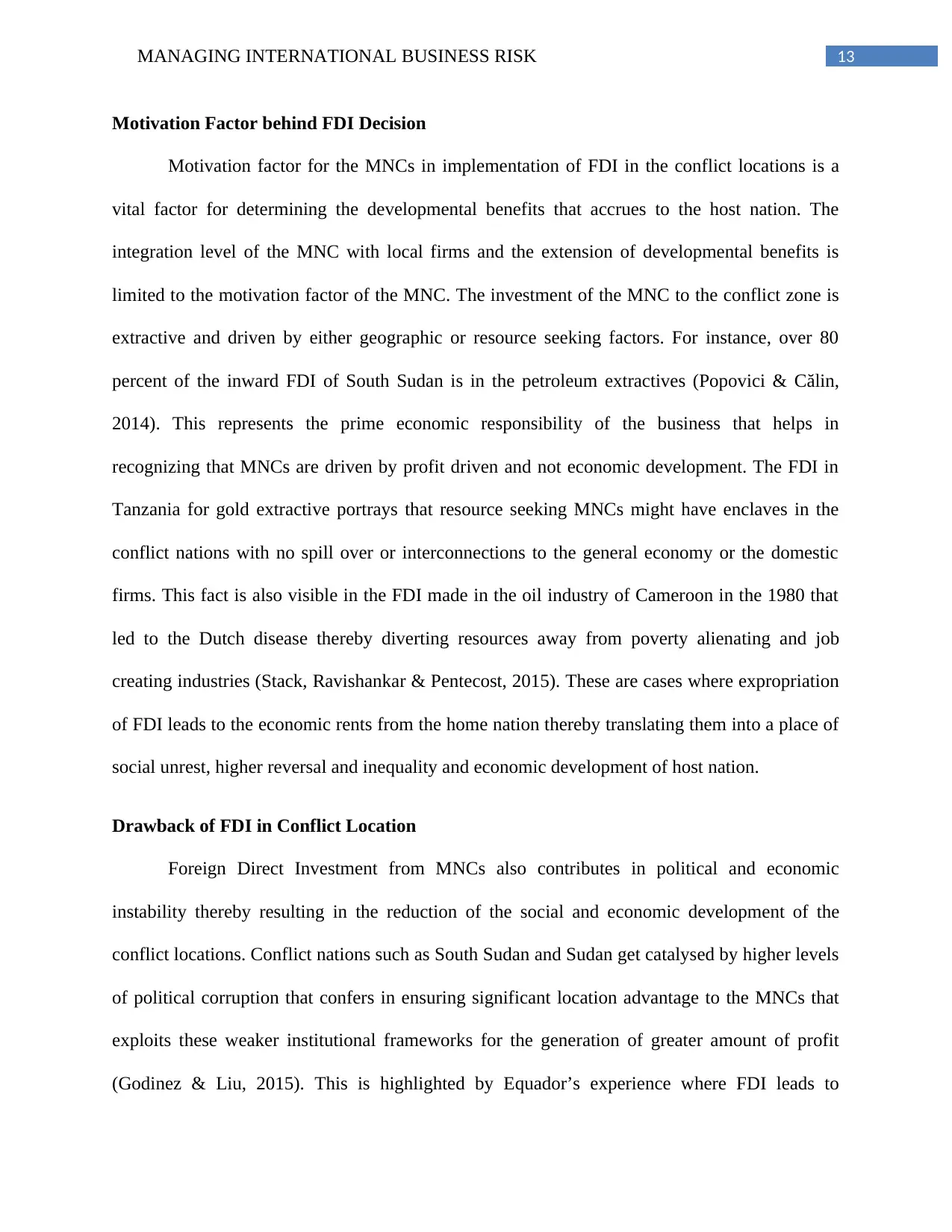
13MANAGING INTERNATIONAL BUSINESS RISK
Motivation Factor behind FDI Decision
Motivation factor for the MNCs in implementation of FDI in the conflict locations is a
vital factor for determining the developmental benefits that accrues to the host nation. The
integration level of the MNC with local firms and the extension of developmental benefits is
limited to the motivation factor of the MNC. The investment of the MNC to the conflict zone is
extractive and driven by either geographic or resource seeking factors. For instance, over 80
percent of the inward FDI of South Sudan is in the petroleum extractives (Popovici & Călin,
2014). This represents the prime economic responsibility of the business that helps in
recognizing that MNCs are driven by profit driven and not economic development. The FDI in
Tanzania for gold extractive portrays that resource seeking MNCs might have enclaves in the
conflict nations with no spill over or interconnections to the general economy or the domestic
firms. This fact is also visible in the FDI made in the oil industry of Cameroon in the 1980 that
led to the Dutch disease thereby diverting resources away from poverty alienating and job
creating industries (Stack, Ravishankar & Pentecost, 2015). These are cases where expropriation
of FDI leads to the economic rents from the home nation thereby translating them into a place of
social unrest, higher reversal and inequality and economic development of host nation.
Drawback of FDI in Conflict Location
Foreign Direct Investment from MNCs also contributes in political and economic
instability thereby resulting in the reduction of the social and economic development of the
conflict locations. Conflict nations such as South Sudan and Sudan get catalysed by higher levels
of political corruption that confers in ensuring significant location advantage to the MNCs that
exploits these weaker institutional frameworks for the generation of greater amount of profit
(Godinez & Liu, 2015). This is highlighted by Equador’s experience where FDI leads to
Motivation Factor behind FDI Decision
Motivation factor for the MNCs in implementation of FDI in the conflict locations is a
vital factor for determining the developmental benefits that accrues to the host nation. The
integration level of the MNC with local firms and the extension of developmental benefits is
limited to the motivation factor of the MNC. The investment of the MNC to the conflict zone is
extractive and driven by either geographic or resource seeking factors. For instance, over 80
percent of the inward FDI of South Sudan is in the petroleum extractives (Popovici & Călin,
2014). This represents the prime economic responsibility of the business that helps in
recognizing that MNCs are driven by profit driven and not economic development. The FDI in
Tanzania for gold extractive portrays that resource seeking MNCs might have enclaves in the
conflict nations with no spill over or interconnections to the general economy or the domestic
firms. This fact is also visible in the FDI made in the oil industry of Cameroon in the 1980 that
led to the Dutch disease thereby diverting resources away from poverty alienating and job
creating industries (Stack, Ravishankar & Pentecost, 2015). These are cases where expropriation
of FDI leads to the economic rents from the home nation thereby translating them into a place of
social unrest, higher reversal and inequality and economic development of host nation.
Drawback of FDI in Conflict Location
Foreign Direct Investment from MNCs also contributes in political and economic
instability thereby resulting in the reduction of the social and economic development of the
conflict locations. Conflict nations such as South Sudan and Sudan get catalysed by higher levels
of political corruption that confers in ensuring significant location advantage to the MNCs that
exploits these weaker institutional frameworks for the generation of greater amount of profit
(Godinez & Liu, 2015). This is highlighted by Equador’s experience where FDI leads to
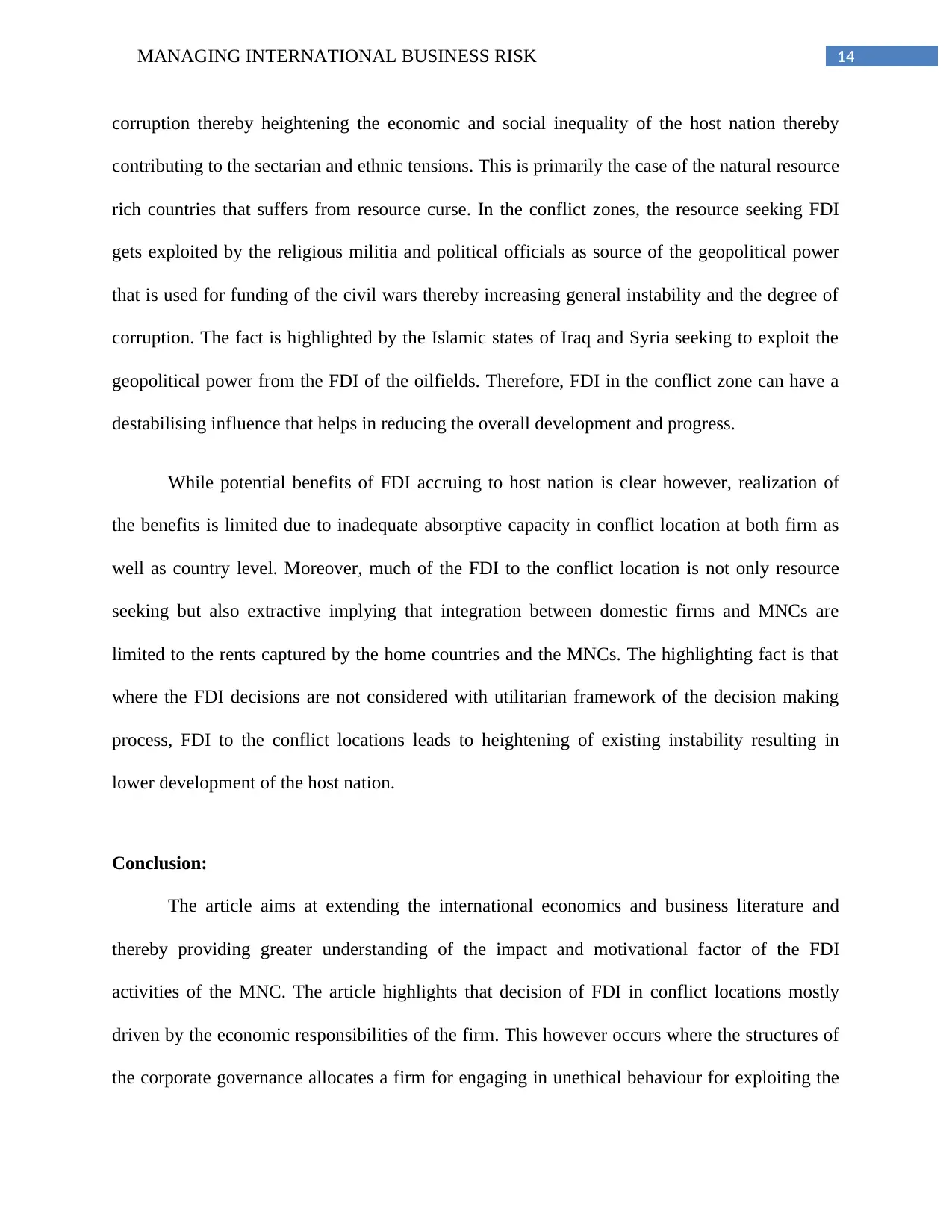
14MANAGING INTERNATIONAL BUSINESS RISK
corruption thereby heightening the economic and social inequality of the host nation thereby
contributing to the sectarian and ethnic tensions. This is primarily the case of the natural resource
rich countries that suffers from resource curse. In the conflict zones, the resource seeking FDI
gets exploited by the religious militia and political officials as source of the geopolitical power
that is used for funding of the civil wars thereby increasing general instability and the degree of
corruption. The fact is highlighted by the Islamic states of Iraq and Syria seeking to exploit the
geopolitical power from the FDI of the oilfields. Therefore, FDI in the conflict zone can have a
destabilising influence that helps in reducing the overall development and progress.
While potential benefits of FDI accruing to host nation is clear however, realization of
the benefits is limited due to inadequate absorptive capacity in conflict location at both firm as
well as country level. Moreover, much of the FDI to the conflict location is not only resource
seeking but also extractive implying that integration between domestic firms and MNCs are
limited to the rents captured by the home countries and the MNCs. The highlighting fact is that
where the FDI decisions are not considered with utilitarian framework of the decision making
process, FDI to the conflict locations leads to heightening of existing instability resulting in
lower development of the host nation.
Conclusion:
The article aims at extending the international economics and business literature and
thereby providing greater understanding of the impact and motivational factor of the FDI
activities of the MNC. The article highlights that decision of FDI in conflict locations mostly
driven by the economic responsibilities of the firm. This however occurs where the structures of
the corporate governance allocates a firm for engaging in unethical behaviour for exploiting the
corruption thereby heightening the economic and social inequality of the host nation thereby
contributing to the sectarian and ethnic tensions. This is primarily the case of the natural resource
rich countries that suffers from resource curse. In the conflict zones, the resource seeking FDI
gets exploited by the religious militia and political officials as source of the geopolitical power
that is used for funding of the civil wars thereby increasing general instability and the degree of
corruption. The fact is highlighted by the Islamic states of Iraq and Syria seeking to exploit the
geopolitical power from the FDI of the oilfields. Therefore, FDI in the conflict zone can have a
destabilising influence that helps in reducing the overall development and progress.
While potential benefits of FDI accruing to host nation is clear however, realization of
the benefits is limited due to inadequate absorptive capacity in conflict location at both firm as
well as country level. Moreover, much of the FDI to the conflict location is not only resource
seeking but also extractive implying that integration between domestic firms and MNCs are
limited to the rents captured by the home countries and the MNCs. The highlighting fact is that
where the FDI decisions are not considered with utilitarian framework of the decision making
process, FDI to the conflict locations leads to heightening of existing instability resulting in
lower development of the host nation.
Conclusion:
The article aims at extending the international economics and business literature and
thereby providing greater understanding of the impact and motivational factor of the FDI
activities of the MNC. The article highlights that decision of FDI in conflict locations mostly
driven by the economic responsibilities of the firm. This however occurs where the structures of
the corporate governance allocates a firm for engaging in unethical behaviour for exploiting the
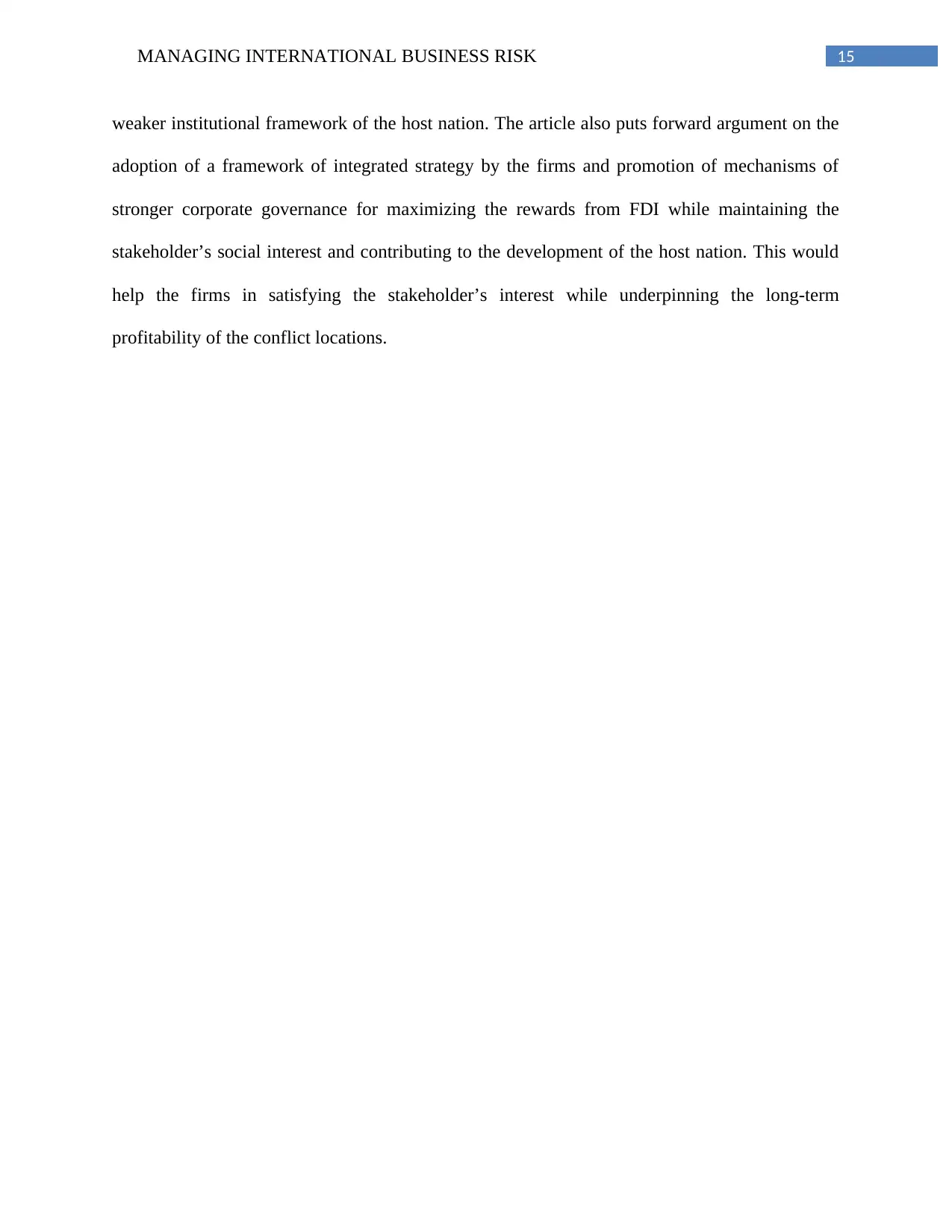
15MANAGING INTERNATIONAL BUSINESS RISK
weaker institutional framework of the host nation. The article also puts forward argument on the
adoption of a framework of integrated strategy by the firms and promotion of mechanisms of
stronger corporate governance for maximizing the rewards from FDI while maintaining the
stakeholder’s social interest and contributing to the development of the host nation. This would
help the firms in satisfying the stakeholder’s interest while underpinning the long-term
profitability of the conflict locations.
weaker institutional framework of the host nation. The article also puts forward argument on the
adoption of a framework of integrated strategy by the firms and promotion of mechanisms of
stronger corporate governance for maximizing the rewards from FDI while maintaining the
stakeholder’s social interest and contributing to the development of the host nation. This would
help the firms in satisfying the stakeholder’s interest while underpinning the long-term
profitability of the conflict locations.
Secure Best Marks with AI Grader
Need help grading? Try our AI Grader for instant feedback on your assignments.
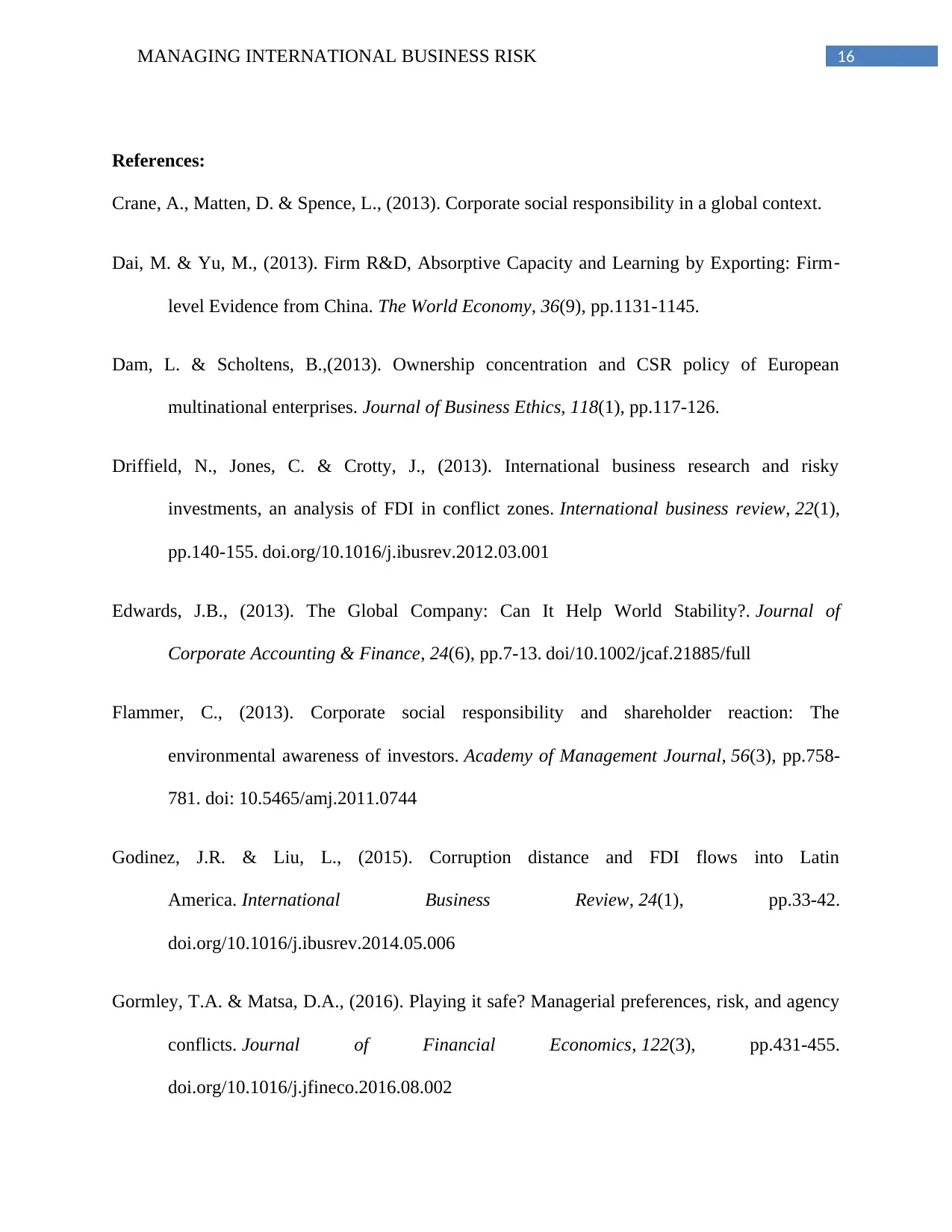
16MANAGING INTERNATIONAL BUSINESS RISK
References:
Crane, A., Matten, D. & Spence, L., (2013). Corporate social responsibility in a global context.
Dai, M. & Yu, M., (2013). Firm R&D, Absorptive Capacity and Learning by Exporting: Firm‐
level Evidence from China. The World Economy, 36(9), pp.1131-1145.
Dam, L. & Scholtens, B.,(2013). Ownership concentration and CSR policy of European
multinational enterprises. Journal of Business Ethics, 118(1), pp.117-126.
Driffield, N., Jones, C. & Crotty, J., (2013). International business research and risky
investments, an analysis of FDI in conflict zones. International business review, 22(1),
pp.140-155. doi.org/10.1016/j.ibusrev.2012.03.001
Edwards, J.B., (2013). The Global Company: Can It Help World Stability?. Journal of
Corporate Accounting & Finance, 24(6), pp.7-13. doi/10.1002/jcaf.21885/full
Flammer, C., (2013). Corporate social responsibility and shareholder reaction: The
environmental awareness of investors. Academy of Management Journal, 56(3), pp.758-
781. doi: 10.5465/amj.2011.0744
Godinez, J.R. & Liu, L., (2015). Corruption distance and FDI flows into Latin
America. International Business Review, 24(1), pp.33-42.
doi.org/10.1016/j.ibusrev.2014.05.006
Gormley, T.A. & Matsa, D.A., (2016). Playing it safe? Managerial preferences, risk, and agency
conflicts. Journal of Financial Economics, 122(3), pp.431-455.
doi.org/10.1016/j.jfineco.2016.08.002
References:
Crane, A., Matten, D. & Spence, L., (2013). Corporate social responsibility in a global context.
Dai, M. & Yu, M., (2013). Firm R&D, Absorptive Capacity and Learning by Exporting: Firm‐
level Evidence from China. The World Economy, 36(9), pp.1131-1145.
Dam, L. & Scholtens, B.,(2013). Ownership concentration and CSR policy of European
multinational enterprises. Journal of Business Ethics, 118(1), pp.117-126.
Driffield, N., Jones, C. & Crotty, J., (2013). International business research and risky
investments, an analysis of FDI in conflict zones. International business review, 22(1),
pp.140-155. doi.org/10.1016/j.ibusrev.2012.03.001
Edwards, J.B., (2013). The Global Company: Can It Help World Stability?. Journal of
Corporate Accounting & Finance, 24(6), pp.7-13. doi/10.1002/jcaf.21885/full
Flammer, C., (2013). Corporate social responsibility and shareholder reaction: The
environmental awareness of investors. Academy of Management Journal, 56(3), pp.758-
781. doi: 10.5465/amj.2011.0744
Godinez, J.R. & Liu, L., (2015). Corruption distance and FDI flows into Latin
America. International Business Review, 24(1), pp.33-42.
doi.org/10.1016/j.ibusrev.2014.05.006
Gormley, T.A. & Matsa, D.A., (2016). Playing it safe? Managerial preferences, risk, and agency
conflicts. Journal of Financial Economics, 122(3), pp.431-455.
doi.org/10.1016/j.jfineco.2016.08.002
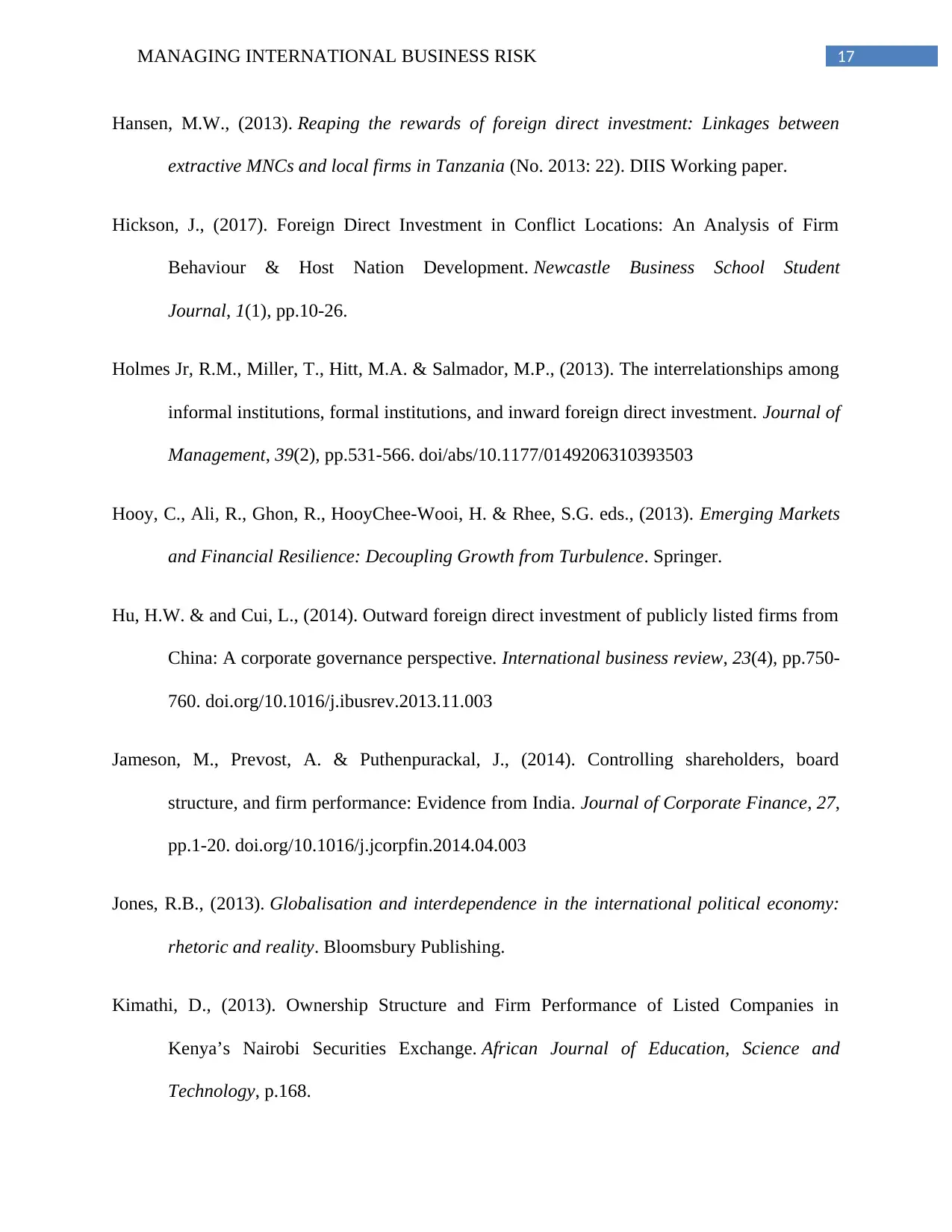
17MANAGING INTERNATIONAL BUSINESS RISK
Hansen, M.W., (2013). Reaping the rewards of foreign direct investment: Linkages between
extractive MNCs and local firms in Tanzania (No. 2013: 22). DIIS Working paper.
Hickson, J., (2017). Foreign Direct Investment in Conflict Locations: An Analysis of Firm
Behaviour & Host Nation Development. Newcastle Business School Student
Journal, 1(1), pp.10-26.
Holmes Jr, R.M., Miller, T., Hitt, M.A. & Salmador, M.P., (2013). The interrelationships among
informal institutions, formal institutions, and inward foreign direct investment. Journal of
Management, 39(2), pp.531-566. doi/abs/10.1177/0149206310393503
Hooy, C., Ali, R., Ghon, R., HooyChee-Wooi, H. & Rhee, S.G. eds., (2013). Emerging Markets
and Financial Resilience: Decoupling Growth from Turbulence. Springer.
Hu, H.W. & and Cui, L., (2014). Outward foreign direct investment of publicly listed firms from
China: A corporate governance perspective. International business review, 23(4), pp.750-
760. doi.org/10.1016/j.ibusrev.2013.11.003
Jameson, M., Prevost, A. & Puthenpurackal, J., (2014). Controlling shareholders, board
structure, and firm performance: Evidence from India. Journal of Corporate Finance, 27,
pp.1-20. doi.org/10.1016/j.jcorpfin.2014.04.003
Jones, R.B., (2013). Globalisation and interdependence in the international political economy:
rhetoric and reality. Bloomsbury Publishing.
Kimathi, D., (2013). Ownership Structure and Firm Performance of Listed Companies in
Kenya’s Nairobi Securities Exchange. African Journal of Education, Science and
Technology, p.168.
Hansen, M.W., (2013). Reaping the rewards of foreign direct investment: Linkages between
extractive MNCs and local firms in Tanzania (No. 2013: 22). DIIS Working paper.
Hickson, J., (2017). Foreign Direct Investment in Conflict Locations: An Analysis of Firm
Behaviour & Host Nation Development. Newcastle Business School Student
Journal, 1(1), pp.10-26.
Holmes Jr, R.M., Miller, T., Hitt, M.A. & Salmador, M.P., (2013). The interrelationships among
informal institutions, formal institutions, and inward foreign direct investment. Journal of
Management, 39(2), pp.531-566. doi/abs/10.1177/0149206310393503
Hooy, C., Ali, R., Ghon, R., HooyChee-Wooi, H. & Rhee, S.G. eds., (2013). Emerging Markets
and Financial Resilience: Decoupling Growth from Turbulence. Springer.
Hu, H.W. & and Cui, L., (2014). Outward foreign direct investment of publicly listed firms from
China: A corporate governance perspective. International business review, 23(4), pp.750-
760. doi.org/10.1016/j.ibusrev.2013.11.003
Jameson, M., Prevost, A. & Puthenpurackal, J., (2014). Controlling shareholders, board
structure, and firm performance: Evidence from India. Journal of Corporate Finance, 27,
pp.1-20. doi.org/10.1016/j.jcorpfin.2014.04.003
Jones, R.B., (2013). Globalisation and interdependence in the international political economy:
rhetoric and reality. Bloomsbury Publishing.
Kimathi, D., (2013). Ownership Structure and Firm Performance of Listed Companies in
Kenya’s Nairobi Securities Exchange. African Journal of Education, Science and
Technology, p.168.
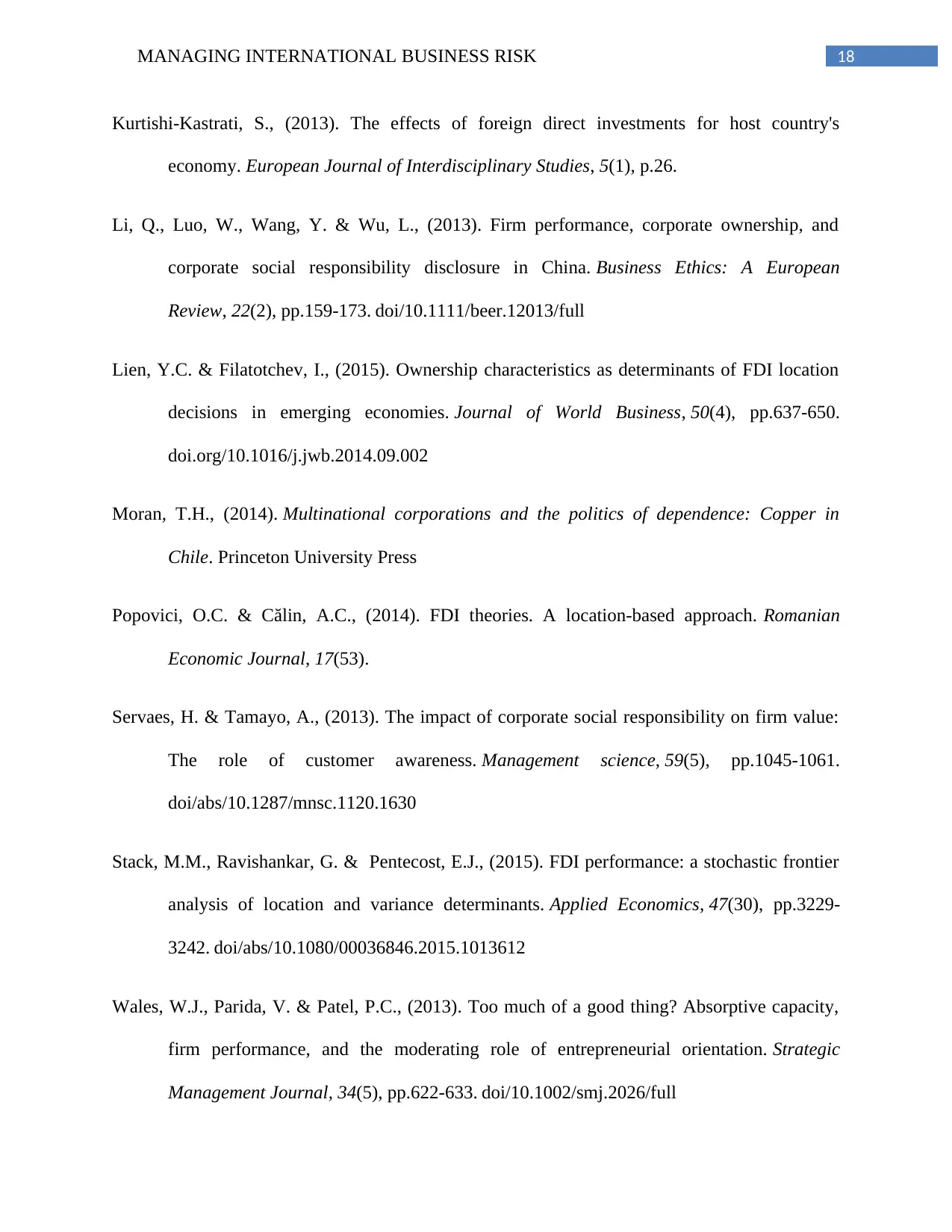
18MANAGING INTERNATIONAL BUSINESS RISK
Kurtishi-Kastrati, S., (2013). The effects of foreign direct investments for host country's
economy. European Journal of Interdisciplinary Studies, 5(1), p.26.
Li, Q., Luo, W., Wang, Y. & Wu, L., (2013). Firm performance, corporate ownership, and
corporate social responsibility disclosure in China. Business Ethics: A European
Review, 22(2), pp.159-173. doi/10.1111/beer.12013/full
Lien, Y.C. & Filatotchev, I., (2015). Ownership characteristics as determinants of FDI location
decisions in emerging economies. Journal of World Business, 50(4), pp.637-650.
doi.org/10.1016/j.jwb.2014.09.002
Moran, T.H., (2014). Multinational corporations and the politics of dependence: Copper in
Chile. Princeton University Press
Popovici, O.C. & Călin, A.C., (2014). FDI theories. A location-based approach. Romanian
Economic Journal, 17(53).
Servaes, H. & Tamayo, A., (2013). The impact of corporate social responsibility on firm value:
The role of customer awareness. Management science, 59(5), pp.1045-1061.
doi/abs/10.1287/mnsc.1120.1630
Stack, M.M., Ravishankar, G. & Pentecost, E.J., (2015). FDI performance: a stochastic frontier
analysis of location and variance determinants. Applied Economics, 47(30), pp.3229-
3242. doi/abs/10.1080/00036846.2015.1013612
Wales, W.J., Parida, V. & Patel, P.C., (2013). Too much of a good thing? Absorptive capacity,
firm performance, and the moderating role of entrepreneurial orientation. Strategic
Management Journal, 34(5), pp.622-633. doi/10.1002/smj.2026/full
Kurtishi-Kastrati, S., (2013). The effects of foreign direct investments for host country's
economy. European Journal of Interdisciplinary Studies, 5(1), p.26.
Li, Q., Luo, W., Wang, Y. & Wu, L., (2013). Firm performance, corporate ownership, and
corporate social responsibility disclosure in China. Business Ethics: A European
Review, 22(2), pp.159-173. doi/10.1111/beer.12013/full
Lien, Y.C. & Filatotchev, I., (2015). Ownership characteristics as determinants of FDI location
decisions in emerging economies. Journal of World Business, 50(4), pp.637-650.
doi.org/10.1016/j.jwb.2014.09.002
Moran, T.H., (2014). Multinational corporations and the politics of dependence: Copper in
Chile. Princeton University Press
Popovici, O.C. & Călin, A.C., (2014). FDI theories. A location-based approach. Romanian
Economic Journal, 17(53).
Servaes, H. & Tamayo, A., (2013). The impact of corporate social responsibility on firm value:
The role of customer awareness. Management science, 59(5), pp.1045-1061.
doi/abs/10.1287/mnsc.1120.1630
Stack, M.M., Ravishankar, G. & Pentecost, E.J., (2015). FDI performance: a stochastic frontier
analysis of location and variance determinants. Applied Economics, 47(30), pp.3229-
3242. doi/abs/10.1080/00036846.2015.1013612
Wales, W.J., Parida, V. & Patel, P.C., (2013). Too much of a good thing? Absorptive capacity,
firm performance, and the moderating role of entrepreneurial orientation. Strategic
Management Journal, 34(5), pp.622-633. doi/10.1002/smj.2026/full
Paraphrase This Document
Need a fresh take? Get an instant paraphrase of this document with our AI Paraphraser
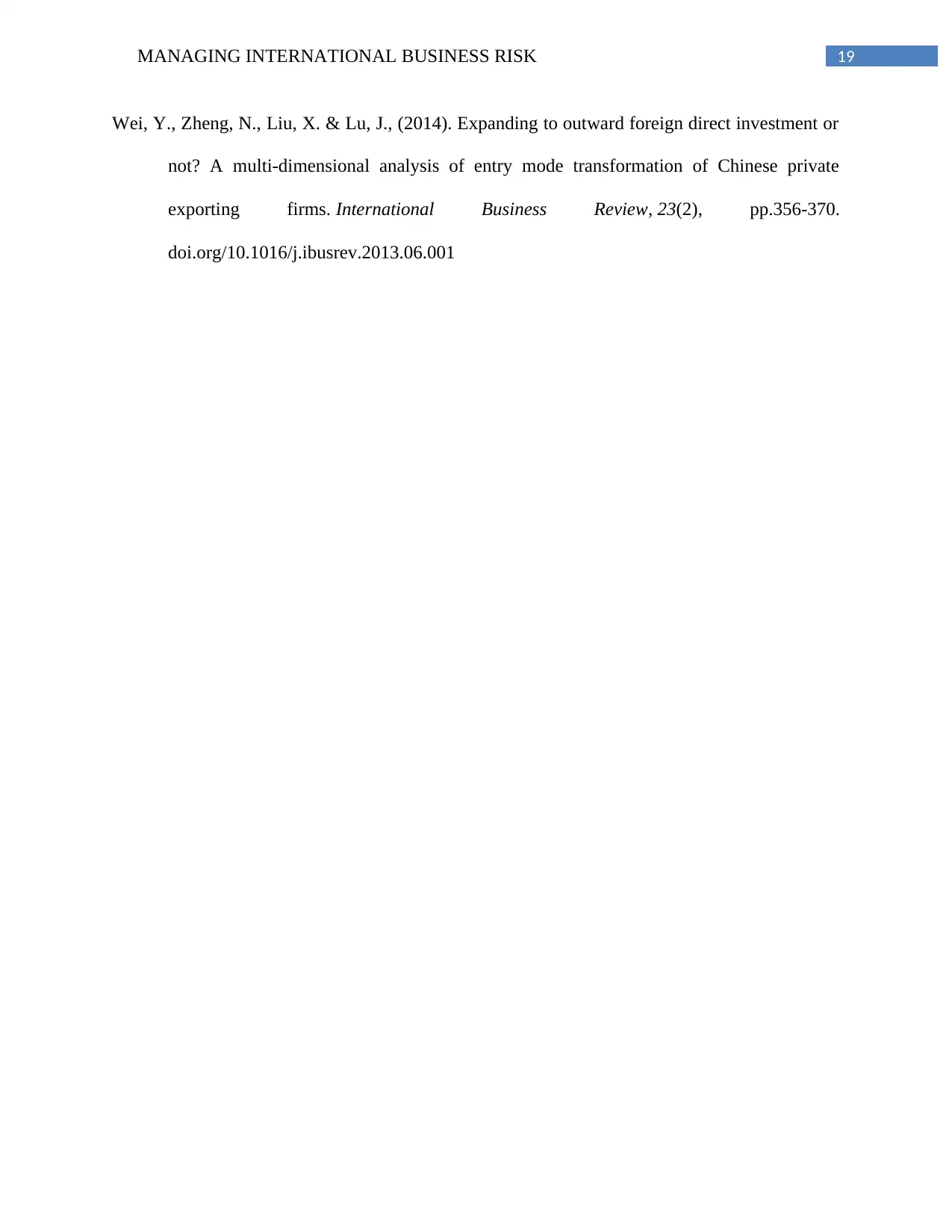
19MANAGING INTERNATIONAL BUSINESS RISK
Wei, Y., Zheng, N., Liu, X. & Lu, J., (2014). Expanding to outward foreign direct investment or
not? A multi-dimensional analysis of entry mode transformation of Chinese private
exporting firms. International Business Review, 23(2), pp.356-370.
doi.org/10.1016/j.ibusrev.2013.06.001
Wei, Y., Zheng, N., Liu, X. & Lu, J., (2014). Expanding to outward foreign direct investment or
not? A multi-dimensional analysis of entry mode transformation of Chinese private
exporting firms. International Business Review, 23(2), pp.356-370.
doi.org/10.1016/j.ibusrev.2013.06.001
1 out of 20
Related Documents
Your All-in-One AI-Powered Toolkit for Academic Success.
+13062052269
info@desklib.com
Available 24*7 on WhatsApp / Email
![[object Object]](/_next/static/media/star-bottom.7253800d.svg)
Unlock your academic potential
© 2024 | Zucol Services PVT LTD | All rights reserved.



